#and the narrative tells that story in every single detail
Text
Hello I’m here to talk about an opinion that isn’t so much unpopular because people don’t like it, but because it is splitting hairs and basically an argument based in semantics that sane people reasonably do not waste their time caring about it.
I am neither sane nor reasonable and therefore think about this a lot, and get ready to pull out a soapbox and type the Text Wall of China any time I hear people offhandedly contradict this opinion, and so I have come here today to die on this molehill, and write the over-long post of my dreams, because fuck it, it’s my blog.
Drumroll please:
Sauron is not The Lord of the Rings
The Lord of the Rings is the main antagonist though, so furthermore,
Sauron is not the main antagonist of The Lord of the Rings
I internally go insane every time someone says “Sauron, the eponymous Lord of the Rings” or “The antagonist never actually appears in Lord of the Rings” or uses Lord of the Rings as an penultimate example of having a flat ‘evil for evil’s sake’ villain. This is mostly in YouTube videos so I’m not calling out anyone here.
So who is the Lord of the Rings? Where do I get this shit? Why should anyone care?
I will tell you in far too much detail under this cut, because I told you I was gonna be extra about it and this is already long enough to inflict on my followers without their consent.
First and foremost, Frodo is not the Lord of the Rings either. Let’s get that out of the way. Gandalf explicitly tells us that in Many Meetings (the first chapter in Rivendell in Fellowship), when Pippin greets a newly awakened Frodo with quintessential Fool of a Took™️ swagger.
‘Hurray!’ cried Pippin, springing up. ‘Here is our noble cousin! Make way for Frodo, Lord of the Ring!’
‘Hush!’ Said Gandalf from the shadows at the back of the porch. ‘Evil things do not come into this valley; but all the same we should not name them. The Lord of the Ring is not Frodo, but the master of the Dark Tower of Mordor, whose power is again stretching out over the world! We are sitting in a fortress. Outside it is getting dark.’
So that’s my theory busted right off the bat! Gandalf straight up tells us the Lord of the Ring is Sauron (‘the master of the Dark Tower of Mordor’ which is Sauron).
But I already told you, this is a hair-splitting semantics-based theory! He said Sauron was the Lord of the Ring. Not the Lord of the RingS. Yes, this whole theory revolves around a single letter difference between the title of the series and Gandalf’s statement, WHAT OF IT?
But in all seriousness. Tolkien was a linguist. There was no way this choice was not deliberate, not on something so important to the narrative. And there is a very important difference between what he is referring to when he uses ‘The Ring” singular, and “The Rings” plural. The Ring that Frodo carried to Mordor has it’s singular nature highly emphasized by the language that surrounds it. THE definite article Ring, the ONE Ring. Just the One. Singular Singular Singular.
The Rings (plural) refers to the rings of power which Celebrimbor wrought, with Sauron’s help, but Sauron is objectively not the Lord of those rings. Not the three Elven ones at least, which he never touched and only suspects the location of. Without his One Ring he has no power over the Three, and a big problem with him regaining his Ring is that he would gain power over those rings, the ringbearers, and the safe realms that had been wrought with them, basically crippling those with the power to resist him.
Him NOT having the Ring, and therefore NOT having lordship over all the rings, is a pretty major plot point. Like, it’s not a reach to say Sauron not having the Ring is what drives the entire story. And he is NOT the Lord of the Rings without it.
And he never gains it, so is the whole series named after Sauron’s aspirations, that the main characters are trying to prevent? I mean, from an angle yes. But also no.
Because while Pippin and Gandalf’s exchange is the closest we come in the text to seeing the title, let me show you the only place within the covers that “The Lord of the Rings” is presented, at least in my beat up third hand 70’s edition. It may not be formatted like this in other editions, but I still think it says something about how we are supposed to read the title:

[Image ID: Masking tape can clearly be seen holding together my poor abused copy of Fellowship, open to the title page. THE LORD OF THE RINGS is written across the top of the page in all caps, directly below it is the Ring Poem, as if The Lord of the Rings is a the title not only of the series but of the poem. /.End ID]
The One Ring is the Lord of the Rings, not Sauron, who is the Lord of the Ring.
“What?” Say imaginary naysayers in my head, “How can a Ring be a Lord? And why does this matter, if Sauron is the Lord of the Ring, doesn’t that make him the Lord of the Rings by proxy? Why are you wasting your and my time making an argument about this?”
I’m glad you asked imaginary naysayer, let me speak to your first point. How can a ring be a Lord? Well, like any good first time speechwriter, I’ve turned to Miriam Webster, and asked it to define a word we already know, in this case ‘lord.’

[Image ID: Screenshot of the Miriam Webster definition of ‘lord.’ The ones that are relevant are 1: One having power and authority over others. 1a: A ruler by hereditary right or preeminence to whom service and obedience are due. And 1f: One that has achieved mastery or that exercises leadership or great power in some area /.End ID]
In the poem, it is the Ring that is spoken of as ruling, not Sauron. Sauron is actually listed in the same position as all the others who receive rings, “The Dark Lord on his Dark Throne” occupying the same place in the sentence structure as the “the Elven-kings under the sky” and “the Dwarf-lords in their halls of stone” and “Mortal Men doomed to die.” It is the One Ring, not Sauron, who rules them all, fulfilling our first definition “A ruler by hereditary right or preeminence.” In this case it would be by right of preeminence, or superiority. The One Ring outclasses the other rings and thus dominates them, binding them to obedience and service. Gandalf calls it “the Master-Ring” when it is first revealed for what it is in Bag-End with the words appearing from the flame.
The Ring has it’s own will too. It’s repeatedly stated to be in control of Gollum when Gandalf is first telling us about it. I’m literally so spoiled for quotes about this that I was paralyzed with indecisiveness over what to use but let’s keep it simple with this one. It’s from Gandalf explaining why Gollum didn’t have the Ring allowing Bilbo to come upon it in the chapter “Shadows of the Past” from Fellowship:
‘It was not Gollum, Frodo, but the Ring itself that decided things. The Ring left him.’
So if Sauron is the Lord of the Ring, and the Ring is the Lord of the Rings, isn’t he Lord of the Rings by proxy? Yes, when he has the Ring. But also being the ruler of a lord doesn’t make the title of that lord your title, if that makes sense. People don’t call Aragorn the Prince of Ithilien, that’s Faramir’s title, Aragorn is King of the Reunited Kingdoms, he rules Ithilien, sure, but by proxy. Ithilien reports to Faramir who reports to Aragorn (I should be calling him Elessar since I’m talking about him as king, but whatever). If Aragorn lost the ability to contact Faramir or Ithilian, he would still theoretically be king there but he would have no practical control, just like Sauron with the Rings of Power.
Why does this matter? It mostly doesn’t. It does not change anything practically in the story at all.
But it matters to me, because it might help change perspective on the antagonist of LotR. It’s the Ring. Sauron is a force in the world, one the Ring is closely allied with, and from whom many of the obstacles come, but the entity that our protagonist is really fighting on every page is the Ring.
If Gandalf were the main character, or Aragorn, or almost anyone else on Middle Earth, Sauron would be the Primary Antagonist. But they are not. Frodo is the Primary Protagonist, and his struggle is NOT against Sauron, it is against the Ring.
If destroying the Ring had not destroyed Sauron, would Frodo have kept fighting in this war? NO! He had his task, and once it was done he was done, even if the world ended afterwards. Everything is driven by the Ring. The threat to the Shire comes from the presence of the Ring, so Frodo takes the Ring to Rivendell. The danger of the Ring is not neutralized by it being brought to Rivendell, so he continues his journey to destroy it once and for all. He doesn’t fight Sauron, he fights the Ring. He fights with himself to keep going in spite of the despair it levels on him, the poisonous words it whispers in his ear, the physical toll it takes on his body. He fights Boromir and Sam (not to the extent he does in the movie, but still a bit) and Gollum over the Ring. He negotiates with Faramir over the Ring.
And the Ring is SUCH a more interesting and nuanced villain to struggle with than Sauron. Sauron is representative of a force in the world. He controls events but never appears, because he acts as the source of all evil, it’s representation on earth (at least now Melkor is in the Void), but it is far more interesting to watch the effect he has on others than deal directly with a character that is so obviously in the wrong in every way. Making Sauron a physical character in LotR is like making the Devil a present character in basically any piece of media that deals with evil.
Evil at its purest isn’t that interesting, because it contains no conflict. Leaving Sauron as an offscreen player leaves us to see characters that are not pure evil struggle with that conflict.
The fascinating thing about the Ring is that it has no power outside of what you give it. But given enough time even the best people, like Frodo, will end up losing themselves to it, as it whispers in your ear with your own voice.
I want to go ballistic when people point to LotR and say it has a one dimensional villain. EVERYONE’S OWN VIOLENCE, DESPAIR AND THIRST FOR POWER IS THE VILLAIN OF LORD OF THE RINGS! Brought to the fore by a small unassuming golden trinket which just happens to also be the titular Lord of the Rings.
Honestly “The Ring is the Villain of LotR change my mind” should be its own big long post with lots of quotes and shit, the fact that the Ring is The Lord of the Rings just being a small point in it.
But unless you are a specific type of interested in story structure and stuff none of this is at all meaningful and it really, really doesn’t matter, so I’m gonna go.
Thanks for coming with me on this dumb journey.
#tolkien#jirt#lotr#lord of the rings#the one ring#Sauron#jrr tolkien#Frodo#story structure#long post… even for me!#hot take#Gandalf#look#I’m sorry ok#this is so inconsequential and I say this as someone who likes meta
8K notes
·
View notes
Text
This is going to sound so pretentious to say, but I think that one of the most incredible things Emerald Fennell did with Saltburn was give it's audience both everything and nothing all at once. But which I mean that every moment we see on screen is so carefully chosen and wonderfully detailed. Every second of the story that Oliver chooses to tell us is perfectly crafted to give us the exact story he wants to create, nothing more and nothing less. Saltburn's narrative lives and dies in Oliver's obsessive recollection, his confessional. Its why these characters who are so clearly and wonderfully rich below the surface can, at a glance, come off as shallow. Oliver didn't care!! And the one he did care about, he gatekept so jealously (I saw someone else's meta discussing this and I absolutely agree) to the point where we as an audience barely know who Felix was. We don't even know who Oliver was, at the end of the day; he was manipulative and ambitious and obsessive and - I could not tell you a single thing he genuinely liked that wasn't Felix. Because that's it, isn't it. That's the story of Saltburn. Everything revolved around Felix, and Felix was everything, and so Oliver's story only focuses on the absolute tragedy of having everything and then losing everything in that one Summer.
And nothing else.
Emerald gave us the gift of Oliver's everything, and the vague, nebulous nothing that he cares about just behind it. The hints of more, jumping off points of intrigue and imagination, things we can extrapolate from and speculate about. There is so much room in this world around it's implications and offhand remarks for us to all build upon. We don't even know if Venetia is Felix's older or younger sister???? There is limitless space to play in this world, both before the events of the film, but also between the few moments Oliver chooses to show us. We see twenty minutes of Oliver's Full First Year at Oxford before he goes to Saltburn, so much of how he falls for Felix and becomes his friend goes so unsaid and unseen, little more than a montage, and Barry and Jacobs's phenomenal chemistry selling their closeness, so we don't have to know each detail.
But that's the thing, that's just bliss; the falling in love is a given in this story, he opens with that. These moments would simply be nothing on the road to everything.
Its like Emerald Fennell is kissing me directly on the forehead and giving her blessing to fill in the blanks. She knew we would; she literally said she knew Saltburn would be a hit on Tumblr, she knew what she was doing. This film was made for those of us who like to over analyse media and also create vivid and intricate headcanons and sometimes both at the same time.
Tumblr, and creatives especially, love Saltburn because it deliberately lets us play in its world, in that sweet spot between everything and nothing, all at once.
#saltburn#saltburn 2023#saltburn meta#felix catton#oliver quick#venetia catton#farleigh start#emerald fennell#elspeth catton#sir james catton#james catton#felix x oliver#felix catton x oliver quick#manicpixieart
321 notes
·
View notes
Text
Clear Sky is a Monster.
Of all the characters in Warrior Cats, I think Clear Sky was the most heavily mishandled.
At every turn, the narrative begs you to sympathize with him, to "understand" the "misunderstood." To this end, his brother Gray Wing is used to "keep faith" in his inherent goodness, his abused son, Thunder, is forced to go back to him over and over, and his second dead wife is completely lobotomized in death to absolve him of all sin.
Because of this, of all this set-up for the "redemption" arc they're trying to tell in the last three books, DOTC is Clear Sky's story. Everything primarily exists to benefit and serve his arc. Thunder and Gray Wing might have POVs, but HE is the character who truly drives the plot. So in order to HAVE conflict for that back half, two evil foreign cats, Slash and One Eye, are summoned to act as contrast.
Their narrative purpose is to display "true evil" to make Clear Sky look less bad in comparison. Unfortunately, Clear Sky is the most malignant, deadly character who has ever blighted Warrior Cats.
The "pure evil" examples they summon aren't effective contrasts because they're flat. Clear Sky is what real abusers look like.
His rhetoric is what it sounds like when a cult leader is trying to keep control over a group. He lies when it benefits him, justifies his actions with his tragic backstory to assuage his guilt and manipulate others, and violently lashes out when his feelings are hurt before blaming his victim for making him angry.
He only made "some mistakes" in that SOME of his actions were accidents-- the vast majority of them were malicious, self-absorbed, intentional choices to punish, hurt, and kill others.
I've spoken about Bumble. I've tallied his body count next to Tigerstar. I've talked about how his infant son's death was his fault in sequel books, and called attention to the infected wound face shoving scene that no one talks about. I can't fit every detail into a single post-- because he's so rancid that I would practically be posting entire books.
So what I want to do here is tackle the heart of Clear Sky. Everything he does, everything he's motivated by, is absolute and utter control over other people. He leverages his "trauma" to evoke empathy from his targets to make them easier to manipulate. He's a dirty liar. He breaks down to physical violence when all other tactics stop working.
He's one of the most severe and realistic abusers I've ever read about outside of very adult literature-- and when I read the reasons why he's attracted to Star Flower, my stomach immediately lurched.
The Killing of Misty
Starvation Rhetoric and the Memory of Fluttering Bird
Aside; a question
Hunger as a punishment; he doesn't care about starvation
Exoneration arc
Predation: Star Flower is a replacement for his son.
I think that index is an evocative content warning. But to say it again; this post contains child and domestic abuse, physical assault, public humiliation, incestuous grooming implications, and a lot of murder.
I need to start with the death of Misty. I see a few people saying that Clear Sky killed her for "being on his land" or trespassing, but this is actually a misstatement that I feel is important to correct.
Misty and her children were on their own land. It was her house. Clear Sky killed her to take it.
This is one of the most important details to remember about Clear Sky, that this is the consistent end point of his obsessive need for power and control. By harassment, by violence, or by death, he will brutalize anyone who does not give him what he wants, or who makes him feel bad, and find some way to justify it.
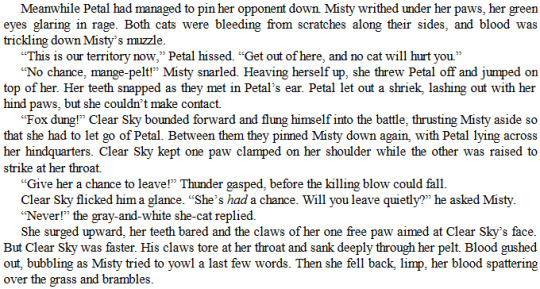
This territory expansion was for no logical reason. There was plenty of food and plenty of land. Any aggression that's happening on this territory is in response to how he's been stealing land and mauling people.
When it's found out she was fighting to defend her children, Clear Sky's immediate response is to slaughter them too.
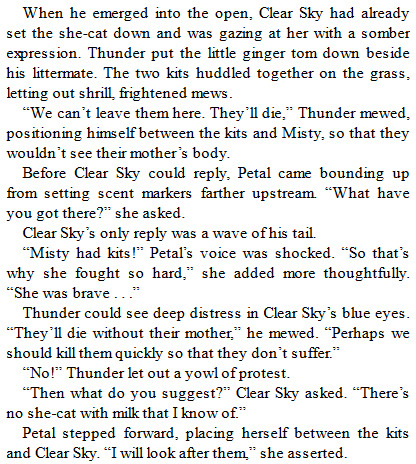
Petal doesn't have milk either. It wasn't about the logistics. He wanted to kill the kids, because looking at them made him feel bad, and she just managed to stop him.
Starvation Rhetoric and the Image of Fluttering Bird
It is often said that Clear Sky is doing this because he's "traumatized" from how his little sister, Fluttering Bird, starved to death in the mountains. That the emotion came from wanting to feed people. That's incorrect. It wasn't about food. Fluttering Bird's death, and all the "starvation" he's faced, are used as manipulation tactics to guilt, influence, and control other characters, particularly when he might meet resistance or be held accountable for something.
It was always, ALWAYS, about control.
He does not care about actually helping people; "Starvation Rhetoric" through Fluttering Bird is an image he can invoke to justify the actions that are as bloody and cruel as the one this post starts off with. Either in his own mind, or in the minds of the cats he's manipulating.
He does this to Falling Feather, before slicing her face open in anger when she doesn't buy it. He does it to Rainswept Flower, before he strangles her to death. And he does it in the chapter just before Misty's murder, both to his Clan and then to Thunder,

Clear Sky climbed up in front of an entire crowd and gave a grand speech about hunger and "adjusting" the borders around territory he plans to conquer. When he gets to "forgiveness" he feigns pain to make his point because he is performing. If the sentiment is not a total lie, then at bare minimum, he is intentionally playing this up for the crowd.
He is rallying the Clan to support his violence against the cats whose land he wants to steal, and selling it with his life's hardships.
The audience is clearly well-trained, because several cats recognize the cue, particularly Frost who is praised for loudly comforting him. This signals "loyalty" because showing your sympathy towards his "suffering" is how this type of emotional manipulation works. It creates a persecuted, righteous in-group.
He's also apparently used this tactic before, since this entire crowd knows what "I Would Never Forgive Myself " means.
He's made sycophants out of his followers. Like a cult leader.
His abused son, however, hasn't been fully indoctrinated yet. Seeing Thunder uncomfortable with the idea of expanding the borders for no reason, Clear Sky calls him over for a personal propaganda session.
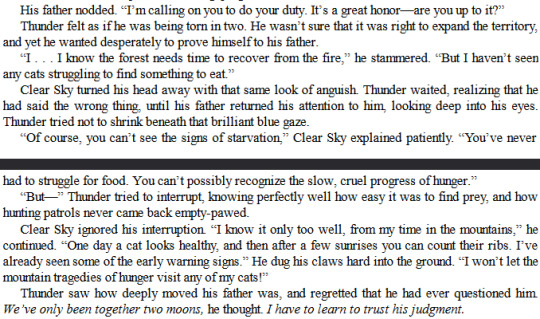
Clear Sky begins the exchange by calling this a "duty" and a "great honor." Immediately framing what he plans to do as righteous.
He puts on the act when Thunder shows resistance, dramatically pausing to let the guilt trip sink in.
"Thunder waited, realizing that he said the wrong thing."
And then Clear Sky launches into infantilizing Thunder, talking down to him like a child who's too inexperienced to see the "signs of starvation," acting like he's being "patient" in "explaining" it.
And then we get it. "I know what starvation looks like (so stop trusting your own eyes) because I have been through more than you (so shut up and do what I tell you), and I'm being a HERO for what I'm about to do (so opposing me would make you a bad person)."
Thanks to these crocodile tears, looking "moved," the act works. The victim is immediately wracked by guilt because the abuser seems genuinely emotional.
He even lovebombs him over the corpse of Misty in the next chapter, making Thunder feel threatened.
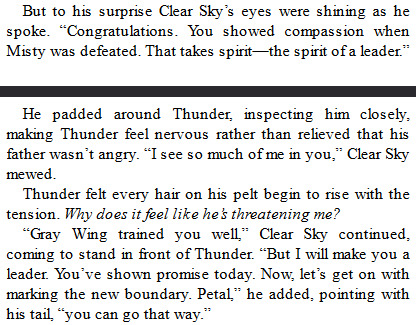
Thunder doesn't have the words to describe what is happening to him, but he knows that this sudden snap to praise isn't natural. That something is very wrong.
A Question.
Before I move on to show that this IS an act, and that he is lying about how important avoiding starvation is to him, I will ask a question. Please think about it, because I promise I mean it genuinely;
Why does it matter if Clear Sky actually believes this or not?
The victims are just as dead either way, yes? Thunder is just as abused and guilt tripped. The entire Clan has been driven towards violence while coddling and cooing at their Supreme Leader. Clear Sky is slowly annexing the entire forest. If you have ever accepted that he had "good intentions" as an excuse for the harm he did, or that abuse and murder was what he imagined was "the right thing," or that his trauma justifies the way he leverages his own pain to make cats do what he wants... why do you think that?
Why does that make it morally better, as the narrative concludes? Would you accept the same for every other WC villain or antagonist? Tigerstar? Slash? Tom the Wifebeater? Brokenstar? Rainflower?
How could you tell the difference, if you couldn't read their actual thoughts on the page? ...are there any other "good intentions" you've accepted, somewhere else?
Don't share that answer with me. It's a question for you. Sit with it.
Hunger as a punishment; he doesn't care about starvation.
...but, regardless, Clear Sky is not deluded about starvation. It's a justification for his obsessive need for control, and always has been. There was no shortage before stealing Misty's land and kits, he is fully aware that there's more prey than they can eat.
He punishes Falling Feather with hunger and harassment for thought crime, by briefly thinking of leaving. But first, he invokes Fluttering Bird at her like he did before, flying into a screeching fit of rage when she doesn't buy it,
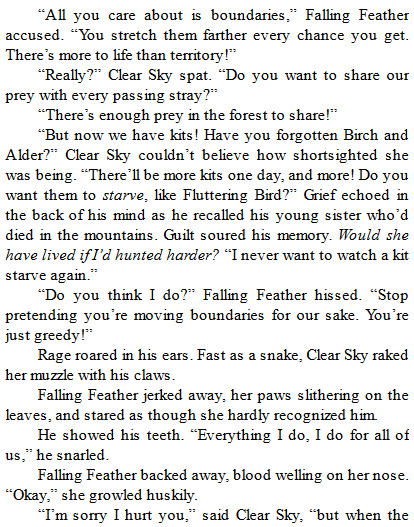
"I'm sorry I hurt you... BUT" is THE wifebeater phrase. THE stereotypical line of a domestic abuser. "I'm sorry I hit you... but it's your fault for making me so angry."
She went through the same exact starvation he did, calls out that he's just framing his greed as being for the collective benefit of his subjects, and is assaulted for that.
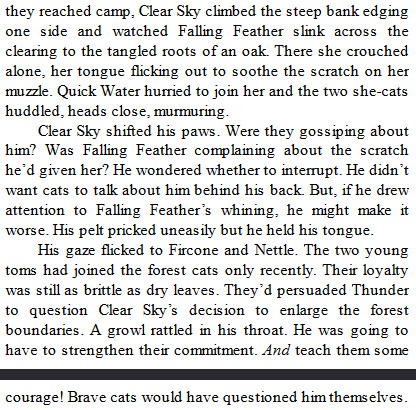
When we're in his head, we see his REAL concerns are not about hunger. He invoked Fluttering Bird to try and make her shut up and bow down to him; what he's focused on is her "gossiping" and "whining" about the open wound he left on her face. He's still furious at Fircone and Nettle for how Thunder QUESTIONED him. So he will "strengthen their commitment."
When "starvation" DOES enter his thoughts, it is to assuage his own guilt and JUSTIFY what he already did. What he already WANTS to do. It's post-hoc.
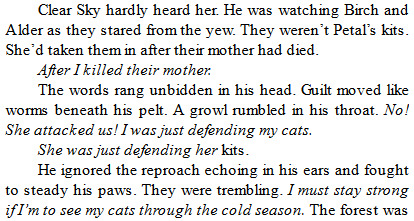
He had to suppress his own guilt at how his greed and ambition made these children into orphans, completely unable to admit that he's ever been wrong or has a change to make, so he invokes the starvation rhetoric at himself to excuse it. So he feels less bad.
Everything, EVERYTHING, in this confrontation is about his pleasure at being able to torment his subordinates. To continue the abuse when the initial confrontation is over. If it isn't pride in his power and control over them, it's plain sadism.
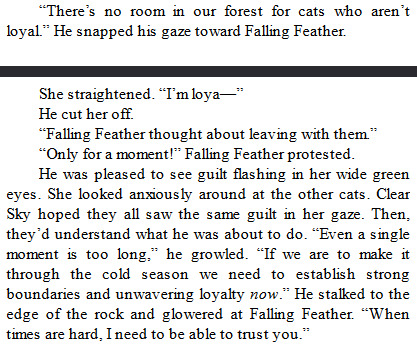
He invokes starvation in front of the crowd, again, after being pleasured at the guilt in her eyes, hoping that everyone sees her writhing with shame and embarrassment. Fear wasn't at the root of why he assaulted Falling Feather; rage was, and now he feels better that he got to humiliate the person who offended him.
Starvation Rhetoric is a manipulation tactic.
It goes RIGHT BACK to his twisted idea of "loyalty." Obedience.
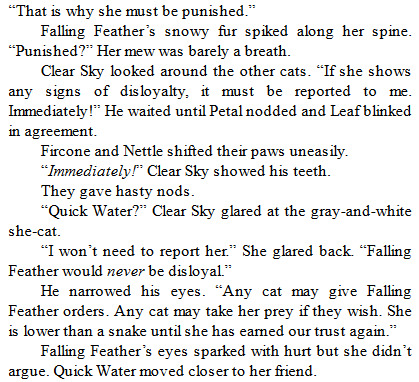
A cat who's actually, primarily concerned about starvation wouldn't encourage other cats to steal her food if they feel like it. He wouldn't be using it as a weapon to retaliate against her because she hurt his feelings.
This is paired with the fact he restricts and monitors the diet of his cats. They eat when he allows it, and only what he gives them, in spite of there being piles of dead animals rotting, going to waste.

We then find he personally doles out food from these piles, plucking carcasses off them and flinging them at his cats, one by one. Probably so he can watch how grateful they are to him and make sure they stay a little hungry-- and definitely because it means he can control WHO gets to eat at all.
If Clear Sky chucked a mouse at Falling Feather and someone took it? She would have gone hungry. For not groveling to him. Like when he decides to starve her brother; a hostage who he promised to feed and care for.
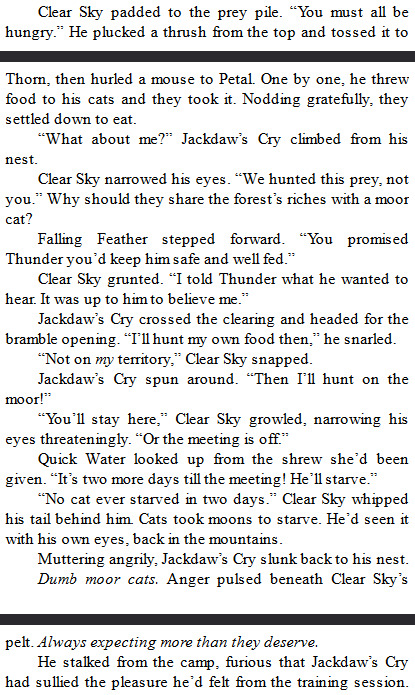
He's a dishonest snake. He lied about abandoning baby Thunder, calling it a "test of strength," he lied about Bumble's death, he lied about keeping Jackdaw's Cry fed.
And he lied about starvation to Thunder, because he was just making up an excuse to steal more land.
He wasn't "seeing the signs" of starvation when he moved to "adjust" his borders. Even FURTHER into this so-called "delusional slip" into tyranny, he's freely admitting that it takes months for a person to starve when it benefits his sadistic need to punish undeserving cats.
"Dumb moor cats, always expecting more than they DESERVE."
Not need. DESERVE. It's not a delusion about starvation and it never was. STARVATION is how he CONTROLS SkyClan, and once again he's angry that his pleasure has been sullied.
The massacre at Fourtrees was started over Jackdaw's Cry catching a bat after being starved, on land that Clear Sky has decided RIGHT NOW that he also owns, because it mades him think about being disobeyed.

The bat is forgotten as Clear Sky pivots into a tantrum, wanting to make his family HURT for being 'disloyal' and 'ungrateful.' For leaving him. He LIKES seeing people grovel, cower, and beg, getting PLEASURE from watching how he can hurt and command other cats, and if you don't give him what he wants he will kill you.
Which, make no mistake, is what the "First Battle" actually is. Clear Sky attempting to murder those who don't worship him or swear their undying fealty to him and his twisted dictatorship. Particularly his own son, the most prominent victim of his emotional abuse.
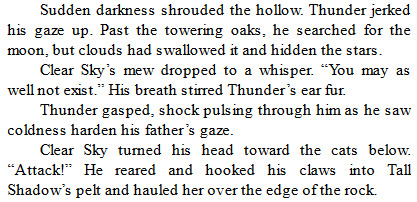

It's not about the bat. It was never even about food or starvation. It's about retaliation for any perceived lack of control.
Once again he breaks out starvation rhetoric to try and manipulate someone, and when Rainswept Flower doesn't buy it just like Falling Feather didn't, he murders her in another fit of entitled rage.
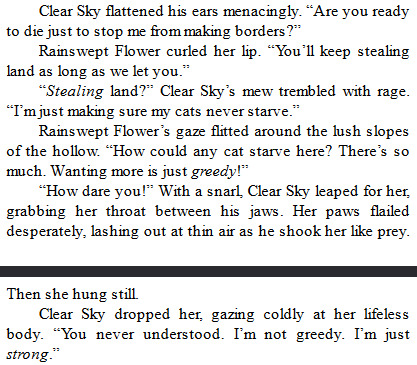
Exoneration arc.
At the end of this battle that was entirely his own fault, we're introduced to the hollowed-out ghost of Storm. She has been flushed of all personality, so that she can be the perfect narrative mouthpiece.
She accepts yet another Fluttering Bird Invocation in spite of how we saw it's not sincere. He was lying the entire time and using starvation rhetoric as a manipulation tactic to get control over his victims.
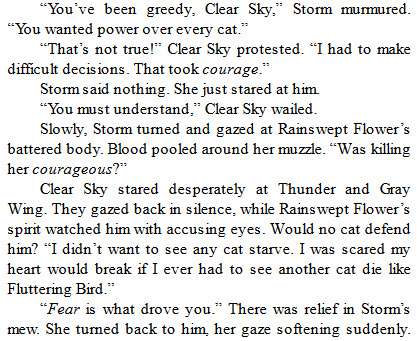
And that's it.
That's the consequence. Storm's a little mad at him until he says "Buttering Flird" and she swoons.
He doesn't have to be ""afraid"" anymore because the cats just invented an afterlife to believe in. He keeps all of his power and influence and gets off scot-free, because "guilt" (which we SAW him repressing anyway) is supposed to be the best consequence for murder, abuse, and tyranny.
The husk of Storm even materializes again at the end of book 5 to say it outright; he "never drove anyone away." Not even after Book 4 where it's also his fault One Eye took over his Clan for 5 minutes. It was just destiny.
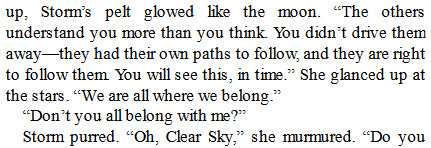
His "redemption arc" is just an exoneration arc. The narrative doesn't think he really did anything wrong.
EVERYTHING about Clear Sky has ALWAYS been about making grabs at power, but since the narrative didn't see a problem with him extorting his personal tragedy and the death of a child, his own sister, he continues doing it. As if these behaviors are normal personality 'traits'.
Even when that sister COMES OUT OF HEAVEN TO YELL AT HIM DIRECTLY,
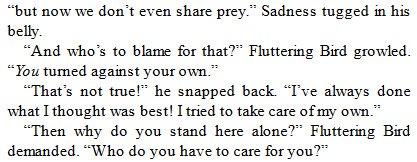
He finds a way to COMPLETELY miss the point, so he can interpret her words in a bizarrely specific way that will conveniently end with him being the supreme dictator of the entire forest. Just like he ALWAYS does.
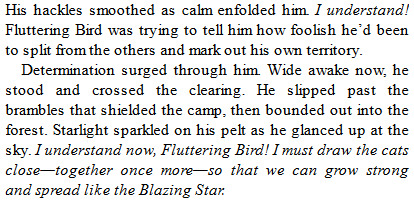
It's the entire 5th book. Clear Sky trying to convince everyone, including himself, that it's Fluttering Bird who wants him to grab at power, NOT himself and his own ambition, that THIS time, he promises, for realsies, it's actually about keeping everyone safe.
But just like ALWAYS, because he does not change, when this tried and true tactic manages to work on Thunder, during ANOTHER exchange where he's dramatically pausing and using the cold shoulder to make his pitiable act land harder,

He lapses right back into bullying his child, creating situations where Thunder will have difficulty or be put in pain, so that he can have an excuse to mock and belittle him.
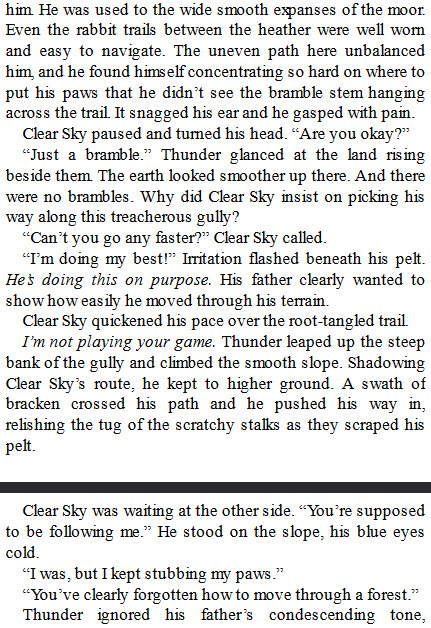
And this all comes to a head when Clear Sky takes romantic interest in Star Flower, his abused son's previous romantic interest.
Predation: Star Flower is a replacement for his son.
Direct parallels are drawn between Thunder and Star Flower. Star Flower contrasts her loyalty to her father to Thunder's "disloyalty" to his own, in an appeal to Clear Sky.
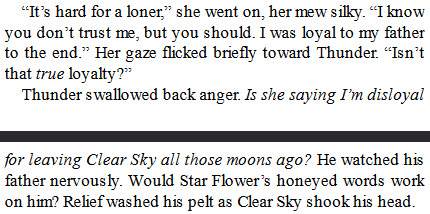
Clear Sky brushes it off for now, citing that he cannot accept her because of who her father was.
But then, Thunder makes the connection between himself and her, because he knows what it is like to be a victim of parental abuse and correctly clocks that they have this in common,

On his vouch, Clear Sky accepts her into the group. She starts trying to offer himself to him; hunting twice as hard as the others, self-imposing harsh conditions like taking a wet sleeping spot. In their second interaction, Clear Sky begins to take interest in her.
Thunder himself points out that Star Flower is seeking an abusive tyrant to replace her own father, which reads like he's deflecting the stress of how his father is abusing him to deny a connection he already made. As if Thunder sees so much of himself in Star Flower that it makes him (rightly) feel sick that his father is romantically invested in her;

Thunder then goes on to follow his own advice and form his own Clan, because Clear Sky IS like One Eye... while Star Flower remains here. At Clear Sky's side. Because she feels like this is what she "deserves," that she "understands" him, truly believing that her crime (warning her father that Clear Sky brought an ambush in case he lost the 1 on 1 death match he requested, which he did) are on the same level as his abuse and murders.
Clear Sky is attracted to Star Flower because, in his own words;

She is young.

She will not betray him.

She won't question him,
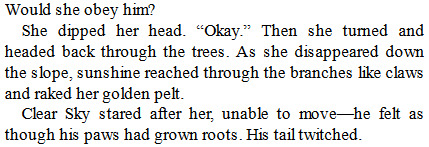
and she obeys him.
We've seen what "betrayal" is to Clear Sky-- not taking his excuses or his beatings. To "disobey" is betrayal. To "question" is disobedience.
These are ALL things he's tried to drill into Thunder. We saw him happily exploit their difference in age to tell him he can't have an opinion. He constructed humiliating games in retaliation for ever being questioned. He tried to murder Thunder and his friends for their "betrayal." Even now, being disobeyed causes explosive reactions.
He was previously grooming the things he now identifies as attractive in a young woman into his child.
If your body becomes too useless to serve him, like Frost and Jagged Peak, you're thrown out. If you don't unquestioningly follow his bloody commands, like Falling Feather or Thunder, you're subjected to abuse and public humiliation. If you're in his way, like Misty or Rainswept Flower were, you die.
If you meet all of his expectations...

You will be in a horrific position where you will never have agency over your own life ever again. Every move, every word, will have to be carefully crafted so that he feels like you're "loyal" to him by the arbitrary standard he feels that day. Never step out of line, never doubt his decisions, never live for anyone except him and the children you will give him, not even for a moment, because then you will not be "worthy" of his grace.
Star Flower would be in serious danger if this series wasn't written by abuse apologists. They accidentally wrote a perfect reflection of how child abuse victims often find themselves in unsafe and toxic romantic relationships with large age gaps which mirror what they went through as kids; but this team doesn't clock it, playing this relationship as wholesome and genuine.
He finally has someone who ""understands"" him. Because they think the character they wrote is misunderstood.
but reality is plain to see.
Clear Sky is a monster. The most realistic monster in all of WC-- far, far closer to real life predators and domestic abusers than the "born evil" rogues like Slash and One Eye. The Erins seem to believe that what separates Clear Sky from One Eye is "fundamental" good and "fundamental" evil, when the truth is that they'd be separated by very, very little.
If they had realistic motivations, they would be exactly like the character their existence is meant to excuse.
Slash and One Eye HAD to be kept flat and one-dimensional. If the book was more earnest, the only difference between Clear Sky and One Eye would have been that One Eye is stronger. So strong that Clear Sky needed to manipulate the other groups into helping him.
While anyone can change, not everyone will, and Clear Sky has no reason to. He sees no consequences. He has everything he wants; power, a pretty and obedient young mate, and unchecked authority over a brainwashed forest cult. There is always a victim on a leash, a naive enabler, or a bunch of desperate and gullible marks somewhere in his proximity to bully into doing his dirtywork
Whether his "intentions" were sincere or not (evidence points towards not) at its root it was always about control. Power is something he perpetually keeps, and continues to violently use.
#Cw incest#Incest implication#Child abuse#Cw child abuse#Domestic abuse#Cw domestic abuse#Clear Sky#Warrrior cats analysis#Clear Sky wc#Star Flower#Dotc hate#Star Flower wc#Thunderstar#Cw Abuse#Abuse#Cw grooming#Grooming#Ask to tag#I know this is a really fucking heavy one#I had several people read this for me beforehand to double and triple check what I'd written.#And im relieved that it's finally finished.
376 notes
·
View notes
Text
#RWRBMovie: Designing the sex scenes
“We need to make sure that it is unambiguous to anyone watching this scene what precisely is happening,” he says. “We’re going to be accurate to the body positioning, to the breath, to the moment of insertion.”
Working with intimacy coordinator Robbie Taylor Hunt, López thought through every possible detail about how two men have sex — and what about that process needed to make it into the scene: “We talked about, ‘Does the prince douche before they go in? Do we need to tell the audience that? Does the audience just assume that that’s going on?’”
A great deal of time was spent on whether Prince Henry would be on PrEP, a medication taken to prevent HIV infection during sex. “Robbie and I decided together that the prince is probably not on PrEP, because it would be too dangerous for him to ask for prescription,” López says. “So the prince absolutely uses condoms. And because we couldn’t really effectively answer the PrEP question narratively, we wanted to also just tell the story that the prince engages in safe sex practices and takes his sexual health seriously.”
Eagle-eyed viewers have indeed caught sight of condom wrappers near Henry and Alex’s bed during a couple of points in the film — alongside a bottle of lube.
“Once we had passed a certain part in the story, I was like, OK, let’s empty out some of the lube,’” López says. “Robbie and I were looking at it, like, ‘How much would they use? Like, well, let’s take it down about this much. OK, that makes sense to me.’”
It was also vitally important to López to block out every beat of the sex scene in Paris. “Days before we shot that scene, Robbie and I actually got into the bed together,” the director says through laughter. “There are videos that could, like, ruin both our careers. Because we were like, ‘Alright, we’re having sex. What are we going to do? Okay, this pillow goes here. The condom’s going to land here. I’m going to do this.’ We probably overdid it in terms of the preparation for the scene. But we also wanted to make sure that we got on to set and we had an answer for every conceivable question.”
The opportunity to show two men having sex in what amounts to a major studio romantic comedy was not lost on López. “I’d be a liar if I told you there wasn’t strategy to the scene, that I didn’t want to cause a conversation about why they’ve never seen this scene in a studio film,” he says. But he was also keenly aware of what he was asking of his actors.
“Look, I don’t know if I could do it,” he says. “I’m fully aware that I’m asking two actors to do something that I’m probably not willing to do. I better make sure that I’m not wasting their time, that I’m not making them feel exploited, and that they are included in every single decision, every step of the way. It’s the only responsible way to do it. We knew that if Taylor and Nick didn’t feel safe, we would never have gotten that scene out of them.”
606 notes
·
View notes
Text
The Hero with Dead Parents is not Cliché, it’s Necessary
The staggering number of protagonists in sci-fi and fantasy with dead parents grows every single year. Frodo Baggins, Harry Potter, Luke Skywalker (before the retcon in ESB), almost every Disney Prince and Princess, the Baudelaire children. Beyond the realm of fantasy into action, thriller, romance, mystery, slice-of-life, and bildungsromans.
Dead parents, or parent, is the curse of being the hero of the story and for a very good reason:
Parents are inconvenient as f*ck.
Unless the mom and/or dad is the villain of the story or the entire story is about the relationship with the parent/parents, the “dead parent” trope serves many purposes and while it may be “cliché” that doesn’t mean this trope is bad or, in my opinion, overused.
It’s one less liability the hero has to worry about protecting
It’s one less obstacle in the hero’s path to their adventure
It’s one (or two) less characters to find excuses to stay relevant in the story
It’s a juicy backstory a lot of people can relate to
Trauma. Is. Compelling.
It’s an excellent motivation
And their murder is an excellent inciting incident
Living parents and guardians get killed off both for internal plot reasons, and meta writing reasons: Living parents are a pain in the ass to keep up with. You’re stuck with a character your hero should still keep caring about, keep thinking about, keep acting in relation to how their actions will be seen and judged by that parent. That parent becomes an obvious liability by any villain who notices or cares.
Living parents can of course be done well, unless they’re the villain, but they just kind of sit there on the fringes of the plot, waiting around to be relevant again and they kind of come in four flavors:
There when the plot demands for pie and forehead kisses (Sally from Percy Jackson)
A suffocating but well-meaning obstacle in between the character and their independence trying to do right (Abby from The 100, Katniss’ mom from Hunger Games, Spirit from Soul Eater)
A mentor figure (Valka from HTTYD 2, Hakoda from ATLA)
The only rock this character has left (Ping from Kung Fu Panda)
*Notice how many of my examples lost their partners shortly before or during the plot, thus still giving the hero the “dead parent” label.
Most of these are self-explanatory so I’ll say this: I think this trope gets exhausting when the parents are written out without enough emotional impact on the hero. These are their parents and a lot of the time, the emotional toll of losing them isn’t there, like just slapping a “dead parents” sticker is all you need to justify a character’s tragic backstory and any behavioral issues they might have.
Like, yes, the hero has dead parents, but you still have to tell me what that means to them beyond obligate angst and sadness. When the “dead parents” trope reads as very by-the-numbers, usually the rest of the story is, too.
How present the parents were in the character’s life should be proportional to the death’s impact on the narrative (as with any character you kill off). If they were virtually nonexistent? No need to waste a ton of time. If they didn’t matter to the character before, they don’t need to matter now unless the plot revolves around some knowledge or secret their parent never shared.
Sometimes, the hero’s dead parents are a non issue. Frodo being raised by Bilbo doesn’t impact his character at all. It’s a detail given and tossed away. On the other hand, sometimes the entire centerpiece of the work is revenge/justice/catharsis surrounding the parent’s death—Edward and Alphonse Elric’s entire story is defined by the consequences of trying to bring their mother back from the dead.
As someone who kept one of my protagonist’s parents alive and didn’t make them villains just to spite the trope, I have all the more respect for this enduring legacy of fiction.
You can of course keep the parents alive, but I don't think it's seen as lazy or cheating or taking a shortcut just killing them off, so long as you remember that your hero is human and should react to losing them like a real person.
#writing advice#writing resources#writing tips#writing tools#writing a book#writing#writeblr#character design#character development#fantasy#scifi#dead parents
174 notes
·
View notes
Text
UNRELIABLE NARRATORS; SEMI FINALS

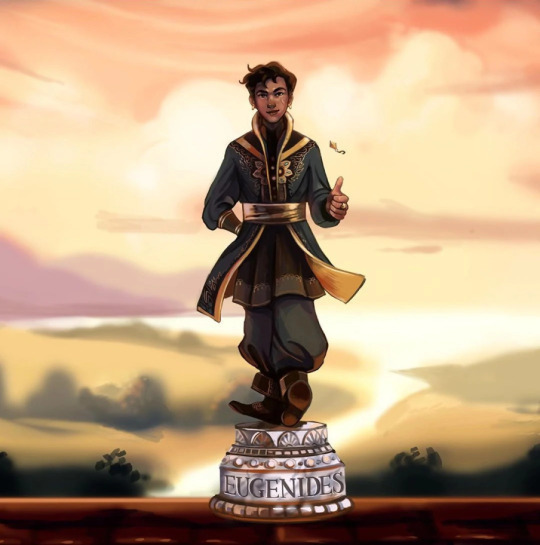
*NOTE; propaganda is out of order due to the post length!
Eugenides Propaganda:
the entire plot hinges on a detail he lets the reader (and every other character) assume is true. I don't want to spoil it because it's a really fun reveal but he is lying from the first second he appears on the page and you can't trust him to tell the full truth about ANYTHING related to himself and his goals. he mostly does it to keep his advantage and not have other characters be suspicious of him but it's just so fun when you realise he's been lying the whole time
Kim Dokja Propaganda:
I haven't read orv but he's fucking gotta be from what I've osmosised
He tries to remove his emotions out of the narrative soooo much, literally the most repressed guy ever. Okay so for context orv is about how this guy, Kim Dokja, has been the only reader of an obscure post-apocalyptic webnovel for years and the novel suddenly becomes reality. And at first you'll probably get the weird impression that his behavior is pretty strange for, you know, a literal apocalypse happening in his world - like yes, he is concerned with survival but he doesn't seem all that scared and he kinda treats it like a video game where he has to grind to make himself stronger and he also treats his companions like a party in an rpg. Then there's also the way he approaches the protagonist of the webnovel, from the start he just kind of describes him as a ruthless psychopath and jerk that is unfortunately a pretty useful ally. And also there's the fact that he carefully omits any mention of his past and when somebody asks if he's worried about his family when the apocalypse starts he just kinda... brushes it off? Anyway so yeah, this bastard is definitely traumatized, although I don't know how much of spoiler territory that would be, considering the fact that literally when he first reveals his trauma he's also unreliable about it. And turns out he does indeed, care A LOT about this world and the people around him. Because well, he kinda didn't care to mention that this webnovel that has become reality was like... literally his whole world before it literally became his whole world. Like, it was the only thing keeping him going for 10+ years and the protagonist that he likes to call a stupid jerk was his comfort character who he pretended to be when he felt like he couldn't handle something in his life by being himself. The protagonist is also canonically the person he loves the most according to a prophecy and he literally can't fathom the thought of him dying, even the timeline versions of him that directly oppose him. And I haven't even mentioned the Fourth Wall yet but I feel like this propaganda is a little long already
misreading the intentions of his companion (yoo joonghyuk) so many time.
YOU DON'T UNDERSTANDDD DOKJA IS SUCH A UNRELIABLE NARRATORRRRRR GOD I COULD WRITE AN ESSAY BUT I KNOW YOU LOVE DOKJA TOO BUT OMG HE'S JUST SO AAAAAAAAAAAH
Rest of Propaganda under cut!
he is the worst like actually. he starts the story talking about how normal and average he is. he is not. he is constantly mischaracterizing his friends and he's so good at lying to the readers that you don't even realize it at first. almost every single time he cries we have to be told by other characters because he never says it himself. there is literally a scene where his narration says "i wasn't crying" and then the in-universe entity that narrates the actions of people (orv is really weird and meta) says that he was, in fact, crying. honestly genuinely anything he says about himself (or doesn't say) cannot be trusted. he is just so frustrating. he drives me mad. i love him dearly. but he drives me so mad.
Dictionary definition of unreliable narrator. Does not tell the reader anything and then things happen and he's like oh yeah btw there was also this and this earlier but i just didn't feel like mentioning it. There's even a thing called the "Fourth Wall" that is able to see through kdj's bs so occasionally you get gems like,
Kim Dokja: I didn't cry
The Fourth Wall: [Kim Dokja was crying]
Imagine being so unreliable as a narrator you need a more powerful narrator to call out the actual narrator.
^ same submission, just spacing it out
This goes into spoiler territory, but; Kim Dokja is in possession of a skill called the Fourth Wall, which on the surface seems like it appears because he read the book that reverse-isekai’d into his own. However, as the story goes on it becomes clear that it’s pretty much a souped up version of his pre-existing dissociation. You cannot trust him to be honest about his feelings, his past traumas or his feelings about his past traumas, not to mention his tendency to just outright omit information that only gets revealed later on either when it becomes relevant or when an outsider POV reveals what’s actually happening.
Exhibit A: he says (in 1st person POV) that he’s not crying. The Fourth Wall immediately contradicts this (as it is literally words of the novel) by saying (in 3rd person POV) ‘Kim Dokja was crying’.
Exhibit B: Fails to mention entire actions when it shows him emotionally honest even in the slightest; we had to read from another character entirely when Kim Dokja was being physically affectionate with his companion. It’s so bad that there’s this entire paragraph about Kim Dokja describing himself hiding his eyes in his hands in jerky, weirdly specific detail and just AVOIDING EVERY WORD THAT MIGHT SHOW HE’S CRYING. The brilliance of ORV is that when you re-read the entire thing you get hints that ‘yes, this WAS hinted at the entire time’ but you have to dig it out of Kim Dokja’s repressed, depressed self-hating internal dialogue with your own two hands.
^ same submission, spacing it out (i really should've done this earlier.)
i am a simple man (not a man). i see a tumblr text post with the words “unreliable narrator in it”. i read nothing else. i reblog & tag #kim dokja okay but in all seriousness i’m just going with the musty basic example: so there’s this moment where he sacrifices himself to save this guy. as he lays on the ground bleeding out, he says “hey, you don’t like me, right? you should kill me to get some money” the guy says “no kim dokja i cant do that (going through the five stages of grief except there’s only one and it’s anger)” the constellations (twitch viewers irl) are like omg he (the guy) doesn’t want to kill his companion (kim dokja) and shower him (the guy) with money kim dokja: oh, he’s not killing me for the money. smart!
as i quote a brilliant youtube video (all of omniscient reader’s viewpoint in 6 minutes) “yoo joonghyuk sees kim dokja as a c_____”
yoo joonghyuk: companion
kim dokja: cunt
^ same submission, once again. spacing it out.
Hides his true feelings, tells the readers what he thinks is convenient for the plot and that his own personal feelings don’t matter or are not so significant. Has unreliable thoughts abt his companion and is a liar. And is also an omniscient reader.
Kim Dokja always perceived his companions in this like nonchalant way like “oh yeah we get along but really we’re just fighting to survive (apocalypse setting) it doesn’t run that deep” when they all do genuinely care for him and he does in turn. He just, doesn’t think of it as an equal relationship? Dokja’ll sacrifice a lot for them but will get seriously flabbergasted if they do the same thing, so fricking problematic. Not to mention Yoo Joonghyuk, his “Life and Death Companion” (read: husband). Kim Dokja always seems to think that Joonghyuk has it out for him, which is kinda true, but he is literally blind to the fact that he’s attached to him. Like, it’s so obvious??? Also they have hella sexual tension but that’s another thing entirely
se get some many pov changes where kdj in his pov just assumed things based on what he knew the characters would do. however because of his interference the characters have changed and he wouldn’t know that if it hit him in the face
He's an unreliable narrator because he lies to himself and thus the audience. He literally rewrote his own childhood core memory. If someone says, "this guy is my friend!" He will go through so many hoola hoops in his mind just to rationalize it. Because he fundamentally believe that no one could love him and even if they did they couldn't know him and he's just gonna hurt them. He cries sometimes in canon but a lot of those times it's not even mentioned as crying he's that unreliable of a narrator. No joke, one time this guys he has a gay thing with called him his "companion" to someone who had just killed him (long story) and this bitch thought "oh wow he's doing it for the coins (another long story) he's so smart i wish I'd thought to that. He's terrible. He literally has an exchange with something called the Fourth Wall (an even longer story) where it said "you're crying" and he said "no I'm not" but he was crying. He makes me insane because the reader is supposed to project onto him. He made me see how much of an unreliable narrator I WAS. ORV is just like that tho.
#kim dokja#kdj#orv#omniscient readers viewpoint#once again#if kdj gets this poll blacklisted again im blowing him up#eugenides#the queens thief#queens thief#unreliable narrators battle#unreliable narrators#polls#semi finals
607 notes
·
View notes
Text
people can interpret my art however they like and frankly it's not that big a deal but when i made that comic with chara talking to the player about it being its/their/our nature to be curious about undertale i got people calling the player the game's ultimate villain and chara truly innocent. and i heavily disagree with that perspective, especially since in my art i like portraying both as chaotic, complex forces. i don't remember if i've talked about it in more detail here but i guess i'll do it anyways. (for the record before i go on with this - no, i don't think chara is evil or a literal demon.)
undertale intertwines game mechanics with its worldbuilding; it's integral to the story it's trying to tell and how it delivers its messages. often we portray saving, loading, resets and files as very literal and concrete things that exist in that world and while i think that portrayal is correct we seem to sweep the player's involvement under the rug no matter how we interpret the story.
in the first few years of the game's existence the framing of chara as a villain was practically inescapable. that coincided with people firmly rejecting undertale's premise of your choices having consequences when we made shit hit the fan. the player had all the agency in the world until we did something to destroy that world and got called out for it and then suddenly it was chara's fault. nowadays we've moved on from that (thank GOD) but have resorted to pointing the finger to ourselves and while yeah, we do tend to pick through everything with a needle to satiate our undying curiosity, i don't really like how fans tend to portray themselves as the ultimate evil that needs defeating, cause here's the thing
undertale doesn't need a villain. it doesn't really have one either. even if you searched for it.
the game intertwines game mechanics with its worldbuilding and the player is a part of it as well. without us there would be no undertale in a literal and story-wise sense, because we're the force that drives the main events, for whom the mechanics and worldbuilding were created. it's a symbiotic relationship. the game has things for us to do, to see, to try and in return we keep it up and running. it was meant for us and i don't just mean this in a "toby fox made a game for people to play" i'm more approaching this from an in-game, canonical perspective.
the player isn't evil, they/we just are. we're a part of this game.
and chara? well, i think they're a reflection of the player. someone to mirror us and that's why in turn they're also a chaotic force of nature. we name them, they haunt the narrative and we give them a life and finish their story. they aren't evil either. chara is just chara, flawed and complicated. that's it, really.
undertale doesn't have nor need a villain because it's not about "good vs evil". it's about choice and consequence which can be taken in every single direction. i really don't know what else to say
547 notes
·
View notes
Text
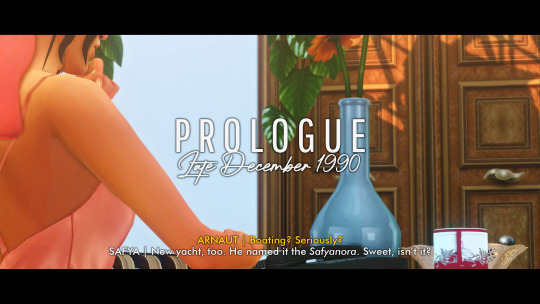
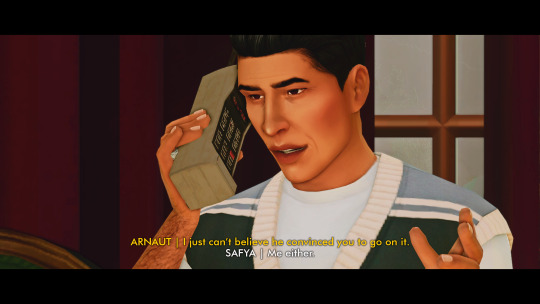


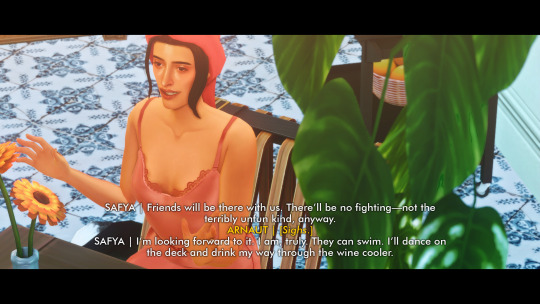


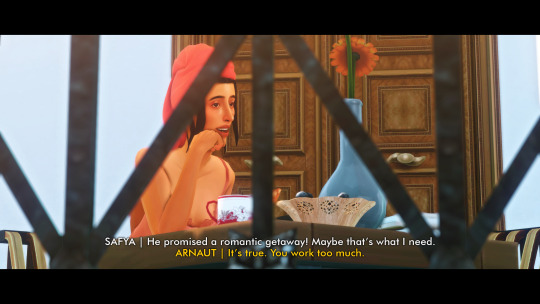


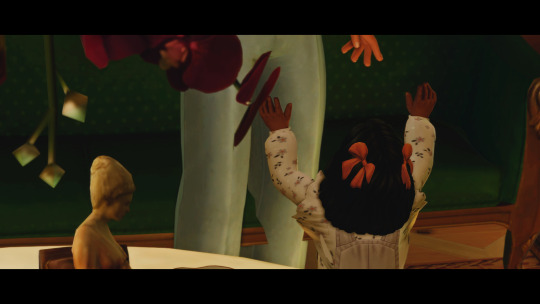
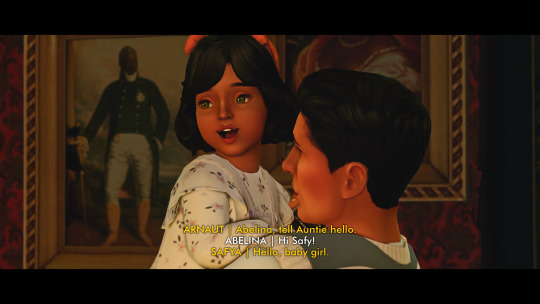
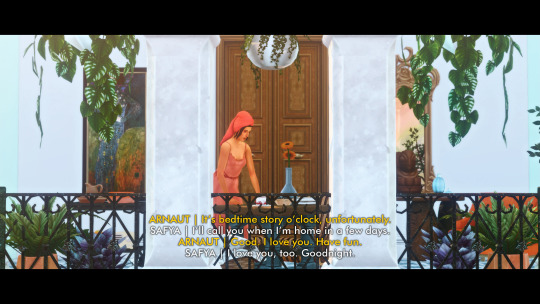


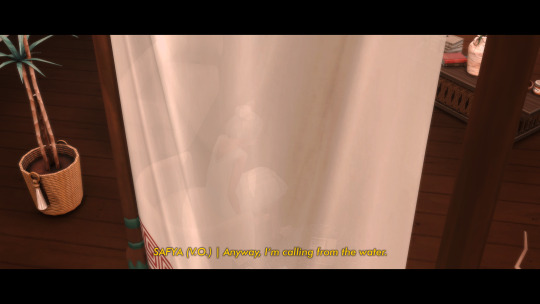

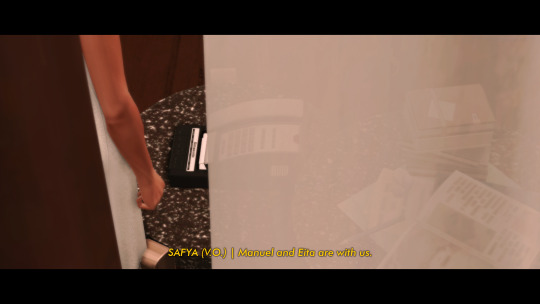
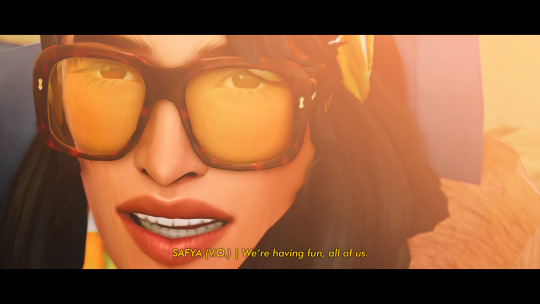
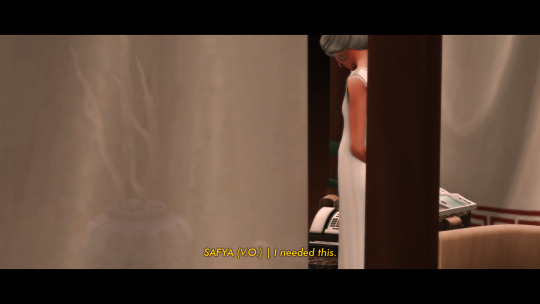
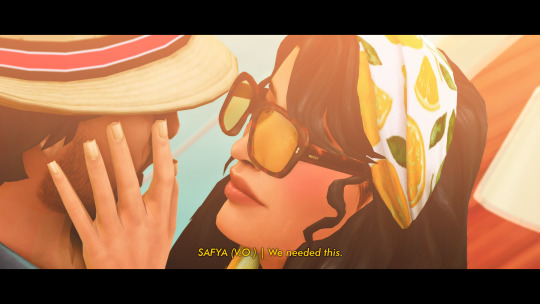




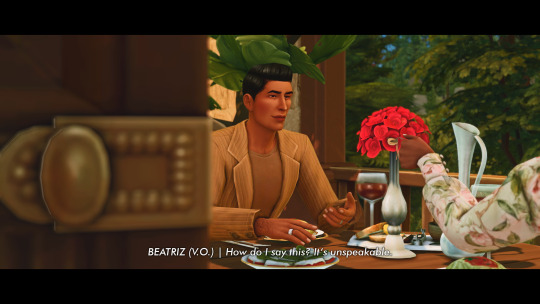

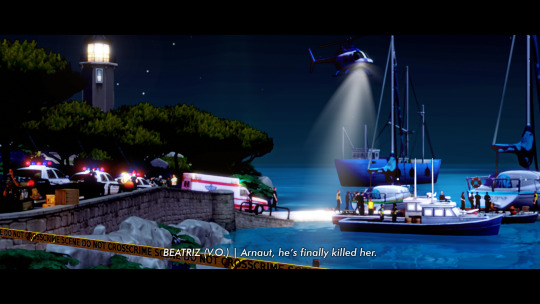
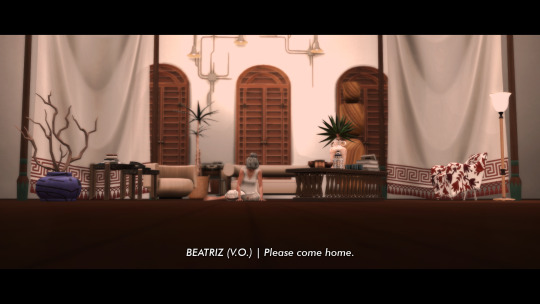
𝐍𝐎. 𝟏 𝐩𝐫𝐨𝐥𝐨𝐠𝐮𝐞 | VARIOUS LOCATIONS, DECEMBER 1990
❧ 𝐝𝐢𝐫𝐞𝐜𝐭𝐨𝐫𝐲 / 𝐧𝐞𝐱𝐭.
❛ The banality of human tragedy wasn’t enough for a princess. Some may have said it was an insult. The publishers, insatiable in their hunger for a story, chased answers. They would force slippery, delicate reality into the shackles of narrative. They would explain the unexplainable. Numerous leads bubbled forth in the immediate days following the event. At first, they came as a respectful trickle of whispers. Then, they came in a loud burst that could fill the amorphous space between breaking news and solemn coverage of a state funeral. Most of the claims were false: the queen had held the gaze of an owl twenty days prior; a storm had thrown and scattered stones in an ominous glyph; waterway residents had heard plaintive weeping from the water before the disappearance; a daykeeper sent a letter to the palace warning the mountains were shaking with longing; the princess was terrified of water and had diligently avoided it before this fateful outing.
The latter was true.
𝐜𝐨𝐧𝐭𝐢𝐧𝐮𝐞𝐝 & 𝐭𝐫𝐚𝐧𝐬𝐜𝐫𝐢𝐩𝐭 ↓
It wasn’t moving water that paralyzed her. She had appreciated the crashing of beach waves and the foaming, rushing flow of rivers. The waterfalls in Yaas had captivated her. The problem was still water. Placid and smooth, the expanses of lakes and ponds and swimming pools unsettled her to the core. Others saw them as gentle and inviting; these comely traits, to her, were the duplicity inherent to any natural danger.
As with many fears, this one had been formative. These bodies summoned memories of gasping and flailing—a visceral recollection of the moment in which her swimming education both began and ended. The publishers would report that she refused to bathe in tubs or put her face beneath a shower head. These details were embellishments, but they knitted together the perfect narrative to rendered the death star-crossed, inevitable, and shadowing even in the unobstructed light of day. With such winking glints of absurdity, a deluge of articles teased intrigue from something utterly ordinary.
Indeed, that was the wretched truth with which the family had to contend, even as days of newsprint consoled the public with fantasy. Once the body was recovered a few hours later, the coroner called it what her fellow passengers had assumed: an accident. People drowned in Uspana every day. Such a demise was considered divinely favored, and the context—the story that underwrote it—didn’t matter. The mountains claimed their favorites regardless of whether their lungs filled with a few inches of bathwater or deep inhales of Canarís Bay saltwater. These favorites were regular people. They were also, from time to time, royalty.
The cause was misadventure, not malevolence.
Still, when Beatriz stumbled over to the telephone on the day she received the news, she took a deep breath to steady herself and said with conviction, “Arnaut, he's finally killed her. Please come home.”
TRANSCRIPT:
[A] Boating? Seriously?
[S] New yacht, too. He named it the Safyanora. Sweet, isn't it?
[A] I just can't believe he convinced you to go on it.
[S] Me either.
[S] We've been giving each other space for a few weeks.
[A] Is that what you call it?
[S] I should put in effort, you know? Be forgiving.
[A] You do. You are. The problem is when he takes advantage of it, which is every single time.
[S] Friends will be there with us. There'll be no fighting—not the terribly unfun kind, anyway.
[A] {Sighs.}
[A] And you're still not wearing the ring?
[S] For now. We'll see how I feel after this trip.
[A] Uh huh.
[S] He promised a romantic getaway! Maybe that's what I need.
[A] It's true. You work too much.
[S] No, you don't work enough—[A] Hold on. Someone's here.
[S] I can let you go … I do have work to do.
[A] {Chuckling.}
[A] Abelina, tell Auntie hello.
[AB] Hi Safy!
[S] Hello, baby girl.
[A] It's bedtime story o'clock, unfortunately.
[S] I'll call you when I'm home in a few days.
[A] Good. I love you. Have fun.
[S] I love you, too. Goodnight.
[S] {V.O.} Hi Mama. Sorry I missed you.
[S] {V.O.} We arrived in Intizara a couple days ago. There were more cameras than usual. It was disconcerting.
[S] {V.O.} Anyway, I'm calling you from the water.
[S] {V.O.} Aren't you proud of me? {Chuckles.}
[S] {V.O.} Manuel and Eita are with us.
[S] {V.O.} We're having fun, all of us.
[S] {V.O.} I needed this.
[S] {V.O.} We needed this.
[S] {V.O.} I know you don't want to hear it, but he's making an effort.
[S] {V.O.} I feel hopeful. Call me back. I love you.
[B] {V.O.} This is not a message for voicemail.
[B] {V.O.} I wish you had come to the phone just this once.
[B] {V.O.} How do I say this? It's unspeakable.
[B] {V.O.} {Sighs.}
[B] {V.O.} Arnaut, he's finally killed her.
[B] {V.O.} Please come home.
#it's TIME !!!!!!!!!!#;long post#ts4 story#ts4 royalty#ts4 historical#sims 4 story#sims 4 royalty#sims 4 historical#ts4 royal legacy#ts4 royal family#royal sims#sims 4 history#sims 4 royal story#sims 4 royal legacy#reyes.story.post#ch.saya#ch.arnaut#ch.beatriz#ch.lorraine#1992.story.post#1992.a1#1992.ep01
135 notes
·
View notes
Note
hi i recently came across your blog and have been reading a lot of your posts about dean - your analysis is incredible. i was wondering... in your opinion, which arc is the worst when it comes to deancrits misunderstanding/critiquing dean unfairly?
so i'm 50/50 on whether this is genuine or bait. if it's not bait, i'm so sorry. you did nothing wrong. it's just that i get a lot of messages that are so very clearly not in good faith. if it is bait, well, joke's on you because i'm about to say a bunch of words and a bunch of people are gonna read them. so.
i think the most obvious answer to your question is the jack situation but i'm not sure it's the correct one. i think by the time we even get to jack (especially to the soulless!jack part of it all) a lot of people have already sort of lost the plot on why dean is ever behaving the way he is. there's this tendency to view his behavior as if he wants to control the people closest to him, not always because he's inherently malicious but often because he wants to keep them safe and keep them close to him to the detriment of himself and everyone around him (see look! it's not deancrit! we know he's not a bad guy. we're just being objective and he's just an abusive asshole who should burn in hell). and i get it. i see how they got there.
but it's frustrating because how they got there is by 1. taking every single thing the characters say at face value despite all evidence to the contrary 2. viewing every single thing dean does or says in a vacuum, removed from any and all context and 3. forgetting that supernatural is a fantasy show, not a family drama or sitcom.
take the demon blood story line for example. what we actually see is:
sam going on a mission for revenge regardless of the costs or consequences (which he's aware exist even if he doesn't know the exact details)
dean trusting his brother until he finds out his brother's been lying to him
sam being told that what he's doing is wrong on multiple occasions by multiple people
dean offering ruby his gratitude for saving sam's life and an apology for the way he's been treating her since he got back from hell
sam continuing to lie and act shady
dean telling sam that he doesn't care about the demon blood/sam's powers, he just cares about sam's behavior
sam draining an entire nurse and killing her
sam almost killing dean on purpose and telling him he's not strong enough, not like sam is
dean still being the one to offer an apology when all is said and done, twice
but all of that gets rewritten into a narrative that dean's just never trusted sam ever and sam was only doing something he thought was right because all he ever wanted to do was save people. how could he have possibly known something bad would happen? and now, even after the fact, even after sam's said he's sorry, dean still won't let it go and holds it against sam forever and ever.
this narrative persists throughout the fandom. why? because sam threw a few tantrums in which he rewrote what was happening and dean didn't protest and the fandom took it at face value. (1)
on top of that, deancrits treat each of dean's actions like they happened in a vacuum. one of the things deancrits fixate on the most regarding the demon blood plot is dean saying, "You walk out that door, don't you ever come back." in 4x21. they treat it as if dean was being controlling and manipulative; abusive, even. they treat it as if, out of nowhere, dean just decided to throw john's words in sam's face because sam simply wouldn't do what dean wanted him to do.
what actually happened, however, was that sam had been lying to dean for twenty-one episodes about what he was doing, despite the continued warnings not to do what he was doing, and now sam had beaten the shit out of dean, left him bruised and bloodied on the floor, to go do something that dean had been told repeatedly, from a source they all thought was the authority on the subject, that sam absolutely should not do. what actually happened was dean made a last-ditch desperate effort to stop his brother from doing something dangerous that would get himself and possibly a lot of other people killed. (2)
the deancrits also tend to magically forget they're watching a genre show, not a family drama, when it comes to analyzing dean. the source of conflict wasn't that dean just didn't like sam's new girlfriend because sam trusted her more than him. it was that sam's new girlfriend was a demon and dean had just gotten back from forty years in hell being tortured... by demons. it was that dean had angels of the lord, before he really knew that the angels couldn't be trusted, telling him he needed to stop sam. it was that the angel that rescued him from an eternity of torture and becoming a demon himself told him that he needed to stop sam. (3)
so the deancrits frame this conflict between sam and dean as if dean just didn't trust sam, for no reason other than sam was hanging out with somebody else, and dean was being irrational about it. after all, sam was only trying to stop lilith, right? dean was being irrational and controlling. and it sounds reasonable when you look at it from their perspective. but their perspective is not anywhere near the reality of what was actually happening.
and that happens over and over and over again. we see it with the idea that dean is the one who is codependent to a toxic degree, despite all evidence to the contrary*. we see it with the idea that dean thinks all monsters should die and sam wants to save/help them. we see it with the conflict in s6 being framed as dean just being angry that cas dared to do something without his permission. we see it with the fractured relationship between the brothers in s8, both regarding dean's return from purgatory and the trials. we see it with the gadreel arc and then the one with cas leading the angels. we see it with the mark of cain and the darkness. we see it with mary's return. and then we see it with jack, and most especially we see it with soulless!jack.
it's all so exhausting. by the time we get to jack, the deancrit has piled up the same way the narrative circumstances weighing on dean have, and so it feels like deancrits are fundamentally misunderstanding the situation more severely than they have anything else but i think in reality it's just the last straw.
so i guess what i'm trying to say is that the misunderstanding isn't necessarily about the individual arcs but about the way a genre story is told in general. they're not just unfairly critiquing an arc. they're mischaracterizing a whole ass dude and fifteen seasons of a show.
*dean dragged sam back into hunting. how do we know that? because sam said it. what did we actually see? dean bringing sam back to stanford for his interview. sam going back to hunting because of the fire that killed jess. dean wanting to take a break from hunting several times while sam kept pushing them to keep going. dean wanting to split up and stay away from each other for awhile after the demon blood thing. sam leaving amelia before he even knew dean was alive/back from purgatory. dean telling sam to go back to amelia. sam choosing, all on his own, not to go back to amelia. sam basically threatening suicide because dean had other friends. sam unleashing the darkness because he didn't want to be alone. etc. etc. etc.
**also i think there is a conversation to be had about dean's coping mechanisms and trauma responses being less palatable though not anymore harmful than both sam's and castiel's but that's a different conversation for a different day
204 notes
·
View notes
Text
Jazz For Two
What an absolute mess of a show. What a muddled message about family and intimate partner violence and abuse. What a nonsensical progression of scenes masquerading as a story.
I have been scratching my head about this one all the way through, but today's final episodes really took the cake. There are so many problems with this show that I could break down in great detail, but the biggest problem as a piece of storytelling is that nothing the characters do makes any sense. Let me illustrate this by describing the progression of Seheon and Taeyi's arc in episode 7 in four scenes:
Taeyi reacts to Seheon's kiss with violent homophobia, calling him slurs and sexually harassing him as a form of mockery
Taeyi feels bad, goes to the piano room, plays a tune, says he's sorry and kisses him, all while Seheon passively lets it happen
Taeyi puts his arm around Seheon, flirts, and struts around the school hallway with him, looking very much like a couple
Taeyi jokes around and tries to kiss Seheon in the piano room
All of this happened within 15 minutes of screen time, with no connective tissue between these scenes to explain the huge change in Taeyi that occurred overnight, or give any agency to Seheon as this boy alternately abuses and hits on him. Homophobia has been a huge and looming threat throughout this show, but suddenly Taeyi is just fine openly flirting with him and Seheon is fine with being attacked one day and kissed the next.
And don't even get me started on the side couple, where we have a character who inexplicably loves someone who has been violently homophobic toward him, as well as assaulting others both physically and sexually in front of him. In episode 8 we learn that Taeyi's brother also loved a boy (Seheon's brother) who rejected him cruelly due to internalized homophobia. Every single pairing in this show is a dynamic of the abused party inexplicably desiring someone who has abused them. I don't understand why any of them like each other, and I straight up don't believe most of these scenes. There is no consistency either internally to the scenes or as part of a narrative through line, and the characters just do whatever the story decides it's time for them to do regardless of whether it makes any emotional sense. And all of this is playing out alongside a story of familial abuse with no apparent idea of what the story is trying to communicate by putting these plots next to each other. The show doesn't even bother to interrogate this before jumping to a bizarrely shoehorned in noble idiocy/romcom run resolution for the main romance that doesn't fit with anything that came before it, and then jumping to a music festival and montages of the two couples hanging out and making music together as if this has been a show about a nice group of friends in a jazz band all along.
And let me tell you, I wish that had been the show we got. I know this was adapted from a webtoon, but it seems it's quite a mess of an adaptation that took an already dark and dicey story and rendered it nonsensical by messing with the pacing and sequencing of events. I very much do not recommend watching, and between this and the strange mess that became of A Shoulder To Cry On, I will be giving this production company extreme side eye going forward.
67 notes
·
View notes
Text
I keep seeing anti-Maiko people complain that Mai never had a redemption arc to learn about why the Fire Nation was bad, and that's why she shouldn't be with Zuko. And I think that fundamentally misunderstands what a secondary character is. Mai is not a main character. She is a secondary character. She is there to provide support to the narrative, she is there to fulfill her plot purposes and that's it. That doesn't mean she has no character development, but her character development is mostly related to her function in the narrative. In Mai's case, her main functions in the narrative are being Zuko's love interest, and being a key piece in Azula's downfall. Her character development is related to that: we have a girl who is closed off and suppresses her emotions who gradually starts to open up a little through her relationship with Zuko. We also have her feeling like she's always trapped by fear and by others expectations (by her parents and by Azula), and because of her relationship with Zuko, she is able to finally stand up to Azula. That's her character arc. That's what's relevant to her function in the story. Learning about how the Fire Nation is bad is not relevant to her main plot purposes in the story. There's no reason why it can't happen offscreen after the war, with Zuko teaching her about all the things he saw and learned about the Fire Nation during his travels. She is not a main character, the show doesn't need to focus on every single thing about her character. In case people forget, we don't get a "redemption arc" for Ty Lee either, because this is not important, neither Mai or Ty Lee are meant to be the focus of the narrative, we don't need to see them "learning that the Fire Nation is bad".
Another thing that people don't understand is that not every character has to be a copy of Zuko. People act like the only acceptable way for Mai to learn about the wrongs of the Fire Nation is by having a redemption arc like Zuko, but that's not really the case. It's not even feasible: Mai didn't go through the same experiences as Zuko, she wasn't forced to live as a commoner amongst the Earth Kingdom peasants, she wasn't forced to flee as a refugee, so she never really had the opportunity to speak to these people and see their plight the same way Zuko had. Of course Zuko is the one who gets the redemption arc, because he is the main character for which this arc actually matters to the story, but also because the circumstances of his story allow him to have this arc, while the circumstances of Mai's story don't. But that in no way means she is irredeemable or that she can't learn, it just means she will learn about the Fire Nation in a different way than Zuko did, probably through Zuko himself telling her about his experiences and the things he saw. And there's nothing wrong with that! Mai is not a main character, she doesn't need to have some epic redemption journey. She was a Fire Nation noble, just like Zuko, she was taught the same kind of propaganda that Zuko was, so of course she's going to believe in it and believe that Zuko is betraying his country when he tells her he joined the Avatar. But Mai is also not some cruel person, and she's also not a Fire Nation fanatic. If after the show Zuko told her about all the things he saw, she would listen. And in fact, the evidence we have is that she did listen to Zuko and she did learn about the Fire Nation: in the comics she works with Zuko against the New Ozai Society even after they break up. And if you don't want to use the comics as evidence, we have the epilogue of the show as evidence, in which Mai is shown to be on good terms with Team Avatar and playing Pai Sho with Suki. We don't need to see the details of how Mai learned about the Fire Nation being bad (she is not a main character, it's not relevant to the main story), we know that she did learn, we can fill in the blanks with our imagination.
Secondary characters not receiving a huge narrative focus and character development about every single aspect of their characters is not "bad writing". Bad writing would be if the show focused on every detail of every secondary character, because that would be losing narrative focus. Just because certain people don't like Mai with Zuko and use this as an excuse to say why the ship is bad, it doesn't mean that Mai not having a redemption arc is "bad writing".
Finally, this isn't a reason for her not to be with Zuko. Some people argue that Zuko would never want to be with Mai after his redemption because of her still believing that the Fire Nation was in the right, but people forget that if there's one person who knows what is like to have been brainwashed since childhood with propaganda about the Fire Nation, that person is Zuko. And Zuko was way more enthusiastic about the Fire Nation being right and the Fire Nation winning the war than Mai ever was. Why would he hold it against her that she believed in Fire Nation propaganda, when he himself knows what is like to believe in said propaganda? The most likely thing to happen is that he would want to teach her about everything he learned about the Fire Nation, he wouldn't break up with her just because she didn't magically unlearn an entire life of indoctrination.
100 notes
·
View notes
Text
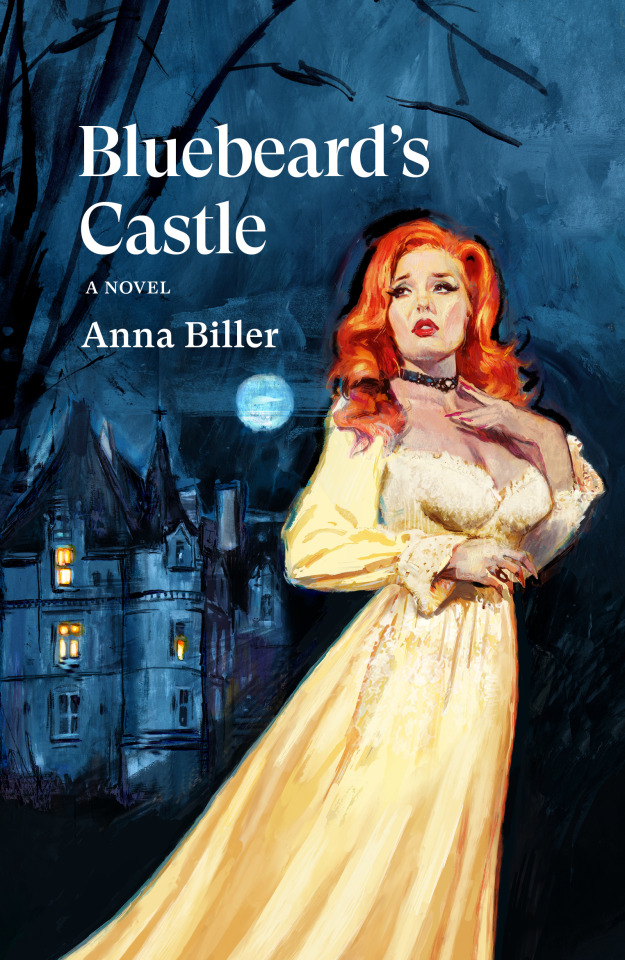
I read Anna Biller's (director, writer, set designer, and basically everything-er of The Love Witch) new novel Bluebeard's Castle. And I really found it to be quite the addictive and enchanting read, though all of the criticisms of the book that you'll see on Goodreads and Amazon are completely legitimate.
The book very much does read like a screenplay -- there are long descriptions of interior design and costumes, sometimes positioned in the middle of a scene in ways that break up the emotional momentum, to a hilarious effect. For example, in one sequence the protagonist is considering a gruesome vision of suicide, and then looks in the mirror to admire her hobble skirt and reflect that she's looking very sexy.
Some of The Love Witch's less charitable viewers didn't understand the way Biller's work sweeps from the grand and romantic to the self-involved and frivolous, but it's clearly intentional, and it works on the page for me just as well as it did on the screen. You just have to have the irreverent, glamorous toxic girl sensibility for it. If you love the way Lana Del Rey mixes the high and low brows, the tragic with the prosaic, you'll lap it up here too.
In some cases, Biller's descriptions do feel like placeholders, or are so generically written that it would make perfect sense in a script (because there is an entire team working on the film that can bring a "sexy" dress or a "lovely" piece of furniture to life), but which falls flat here. Because I know Biller's aesthetic style so well, when she tells me that room is sumptuous or well-appointed, I can picture precisely what she means, and most of the time she is so specific with her descriptions of outfits and accessories that you can easily conjure what she's going for. At some random moments, though, things are underwritten and demand that you as the reader fill in the details she normally provides.
Bluebeard's Castle is the story of a contemporary romance novelist and converted Catholic virgin, Judith, who falls under the seductive spell of an aloof, gruff, emotionally volatile Baron's-son, Gavin, who sweeps her off her feet following a fated encounter at a wedding. After a whirlwind romance and a hasty wedding, Biller's protagonist moves into a remodeled castle with her brooding lover, and the cracks in his shining armor begin to show. The charm of the love interest is something of an informed attribute; you have to believe the narrator that he is handsome and dracula-like (or believe that she believes it) in order to allow the story to move along. Since this is a tragedy rather than a romance novel, I think that buy-in is relatively easy to provide. The sex scenes are largely left to the margins as well; this book isn't meant to titilate but rather pull you into Judith's rich, sad, delusional inner world.
Some of the most positive reviews of Bluebeard's Castle describe this as a novel about how and why women find themselves entrapped within abusive relationships. As someone who has been in abusive relationships, I think this truly is where Biller's writing excels -- and she truly gets what it's like to become romantically and sexually addicted to someone who is bad for you to a degree that is almost embarrassing to see oneself reflected in. She truly gets it -- the way you excuse small violations, blot out any consideration of your own consent, justify unexpected outbursts from your partner and then take steps to prevent them, the way you must romanticize every single tender moment, rewrite the gradual conditioning of your own behavior as yourself becoming a canny, subtle manipulator of the situation, and color in between the lines of a truly unfulfilling existence with grand narratives and self-serving lies.
It's not a pretty portrait -- Bluebeard's Judith has a fanciful, inconsistent mind, constantly swapping between admitting to herself that her husband has mistreated her, and seeking refuge in religion, fantasy, alcohol, sex, and self-negation in order to convince herself that such abuses did not really happen, or don't really matter. She also uses other people -- leaning on her sister and a former romantic interest, the respectful, reliable doctor Tony -- extracting as much attention and support from them as she possibly can when she and Gavin are in a rough patch, then abandoning them entirely the moment he returns to her. I think a reader who hasn't been in an extended abusive relationship will probably find Judith infuriating and unsympathetic. But as someone who has done and been all of these things, I feel incredibly exposed by Biller's narrative, in a bracing way. It's like a shot of cold water to the face.
Many people will justifiably write this book off as melodramatic and arch, but I think it perfectly nails the alluring drama of being wrapped up within a terrible relationship dynamic. When you're being abused and you deeply love your abuser, you are absolutely fascinated by their unpredictable emotions and your own love -- you think constantly about how you might elicit the treatment from them that your heart longs for, you're reading into their every gesture and expression all the time, and you're inventing satisfying explanations for your situation in your head all the time. It's an isolated, deluded life, but it's pleasurably intense too sometimes, and those of us who fall prey to it often have some deeper longing for connection and passion that makes us easier to prey on. Biller really understands that.
If you adored The Love Witch, you'll probably have a lot of patience for this book's flaws and feel appropriately targeted by its strengths. Sad girls, Virgin Suicides fans, BPD baddies, Jane Eyre lovers, grown up former Twilight readers, and all kinds of other pitiful glamorous freaks will enjoy it.
59 notes
·
View notes
Text
Auradon Campus Gossip:
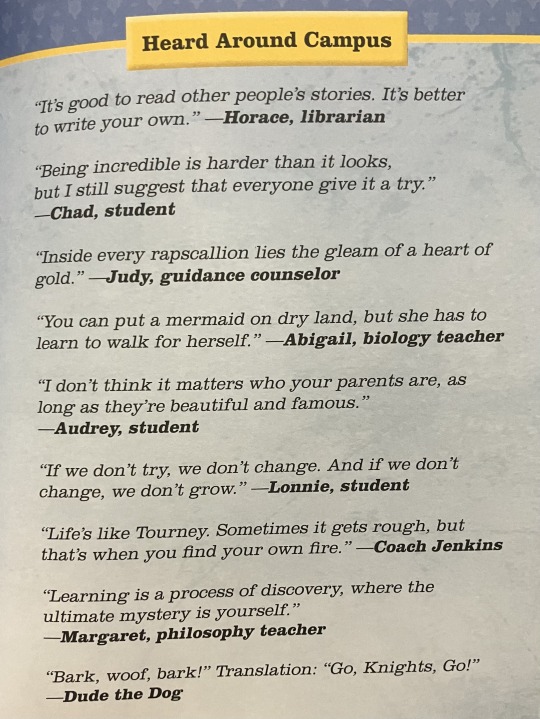
Audrey and Chad are very funny, but ADULTS??
I will be taking these teacher names and running, thank you very much. They’re my OCs now and I will not be stopped.
Horace the Librarian
The cool librarian. Probably the one who started Doug’s enduring idea that bow ties look cool and suave. His color scheme is blue and red, just so he stands out from the students a bit.
Auradon Prep definitely has two libraries, the regular working library, and the research library. Horace works in the research library, helping the older students with their junior and senior projects.
Horace is the best librarian to talk to if you’re struggling with college essays. He’s able to tease a personal statement out of even the most shy students, and he’ll make you feel good about yourself as he’s doing it. He genuinely believes that every single person has a story worth telling, so long as you can frame it the right way. After all, he’s just the son of a bookseller from a quiet village, and look at where he is now.
Judy the Guidance Counselor
Judy genuinely loves her job. She’s here for the guidance, but also for the gossip. She loves working with troublemaker students, because they’re the most fun to work with and she gets to actually help them out.
She tries very hard to be hip with the kids. Judy uses all the slang she’s heard from students, and is totally tubular and hip to the jive of the youth trends. She’s on-trend and bussin.
She wears exclusively pantsuits, because again, she’s young and cool and wears pants instead of skirts. She thinks this will keep her cool in the eyes of the students. Her favorite one is a brown courdroy suit with a matching floral scarf, very vintage Auroria-style.
Abigail the Biology Teacher
She specialized in marine biology in college! Her main research is actually on invasive fish populations in the reefs around Atlantica. She would love to get her hands on the reefs within the Isle of the Lost barrier, but she’s not sure how to balance such an important research topic with her teaching career.
She’s very invested in independent learning. Every year she has her freshmen do a research project on a native species that has personal significance to them, and she keeps a tracking sheet of what all her students choose each year.
An astrology gal to her core, Abigail will detail class to talk about her horoscope if you can time it right. The sophomore bio II class takes the most advantage of this. They’ve made a class theme song for Astrology Moments with Abigail.
Margaret the Philosophy Teacher
Margaret started her career as a castle chaplain, and only switched to teaching after her nieces started asking her more and more philosophical questions. Yes, she is the sort of teacher who will engage in a scholarly debate with a five year old. Her high school students are nothing compared to her sister’s toddlers.
Philosophy isn’t exactly a popular elective at Auradon Prep, so Margaret has a lot of time between classes where she engages in personal research. She’s currently writing a book about the afterlife, and she’s written several well-reviewed scholarly papers about the philosophical implications of children’s internal narratives.
She also acts as a dorm monitor for the junior and senior girl’s dorms. She hosts the best late-night study events, and most of her students genuinely like her as a dorm monitor, even though part of her job is patrolling the halls during lights-out and breaking up their illegal room parties.
44 notes
·
View notes
Text
QSMP The fated cursed team?
Alright, so it’s my time on the microphone I guess.
Without going deep into the reason why (since it’s not the focus), I have a love/hate relationship with Purgatory. It’s an incredible feat for the Admins with all the details in it as well as the events planning, we get to see new sides of the characters, but I hate competition games (when the win is crucial) and how CCs from every team had their “I genuinely am having a very frustrating and not nice time” for various reasons.
This in mind, I’ve been following the “WHO IS CURSED?” question from the start like almost everyone… But with a different viewpoint. See, I’m someone who does a lot of LARPs and Tabletop RPGs, I’ve been animator and dungeon master (I DM once each week right now) so I know well the “Let’s make a plan and see how the players work inside of it”
I didn’t really plan on yeeting a big speech on Tumblr, but I’ve seen a lot of people take hypotheses as facts and got surprised. So let me break things up a little.
The base of a goal.
When you’re making an event/a game/a RPG with a “Someone is cursed”, there are some things you cannot do. Now, the events were planned and, therefore, they planned on the number of teams to go from 3 to 2 from the start. This cannot sustain a “One team is cursed” from the start. Why? Because you have no clue who will win and who will lose. Before the egg event, one could have said “Soulfire will lose because they have put little time on their base compared to the other teams.” You could have said “Bolas will lose because they aren’t the best PVPer and have less gear.” You could have said “Green Gay Ninjas will lose because Red and Blue will ally against them.” Heck, you could have said “No one will lose, they’re going to try to tie.” (All of those before the event even started) Anything could have happened. I, for one, did not expect for Red to win at the beginning of the day. And yet they did.
Ok, let’s back up now.
If a team was chosen as cursed from the start, the admins had at least three ways of making sure the event would last past the egg event.
Make the cursed team with strong-ass players so they had no chance to lose. (Uncertain technique, would be way more visible than what we had/have)
Make the cursed team with every single nerf you can so they’re so obviously cursed that the other teams make sure they stay alive. (A very sad idea, everyone would just already know who needed to win or maybe kill them thinking it was a red herring, again, no one truly fit that 100%)
One person is cursed and they aren’t “cursing” their team until it’s a 1v1 (and not a 1v1v1) (That’s the one that would work the most if the cursed team had been chosen from the start)
Herding cats
Now, as a DM, I’ve herded cats for years now, and here’s what I learned. If you want a precise outcome to your game, you will have to use the three doors trick. Basically, you put your players in front of a choice of doors and whichever door they choose will lead to the room you wanted them to see next. It makes no sense to shoot yourself in the foot and leave the direction of your story entirely to your players if you know it needs to end in X number of games with a specific scene. This doesn’t mean there couldn’t be a cursed team right now, but with all they set up (the nuke, the ‘If they die everyone dies’, etc.) my DM brain is telling me that the cursed team will be chosen narratively at the end while giving meat to the bones of hints we got.
Alright, for the “Cursed team hints” now.
So, one of the most looked at things for the hints were the eggs messages. Let’s break those down quickly. I do not believe one can say “MESSAGES ARE CLUE” without taking ALL OF THEM as a clue.
“No matter what… Protect Tallulah.” Now, this message, like all others, can be read multiple ways. The first one could be about the only Tallulah we actually saw on the island (well, part of her likeness at least), the statue. This one was Red’s statue. So one could say that Red need to win, aka, they are the cursed team. But, you can also read it as “Tallulah will show up later on and she needs to be protected first and foremost.”*
“Nothing is off the table, run over whoever you need to win.” Well, this one, yes, also has more than one possible meaning. The first and most obvious would be “BBH and his team needs to win at all cost.” would fit, would make sense. But it could also be read as “The final choice will be hard, you need to make sure all the residents need to win.” All is a question of point of view. None of these ways to read it are wrong, which, I think, is the point.*
“Dads you won't believe it, it isn't fireflies on the sky run and don't stop” (translated message) This is the most hazy of them all. What vibe this one gives me is - especially since there are some of Richas’ parents in every team - about a future moment. Maybe a final event on the 18th. Another way to read it could be a warning about mobs. It seems less likely, but some mobs in Purgatory turn invisible after someone hits them, leaving only two white dots as eyes. This one is a stretch but my back needs it.*
One message (chayanne) reads more as a Red Team is Cursed. One message (Dapper) reads more as Blue Team is Cursed.
* But you know how else you can read any of these three egg messages? Very cool one liners to bring up the hype about an upcoming event. (but they’re cooler as clues)
The wheel
The wheel is very much uncertain for me, mostly because I don’t think Tubbo was even meant to roll it. At least, definitely not when he did. He glitched through barrier blocks to reach it and then lava was dropped in a “Player get the heck out goddamnit you know you weren’t supposed to be there” way. (As a DM, I know that vibe. No, bard, you cannot SEDUCE MY GODDAMN DRAGON) Now, was he supposed to later? Maybe, I don’t know, but basing a lot of things on that, especially while ignoring that Slime (Red) and Roier (Green) were also there and could have been the ones rolling it doesn’t seem like a fair assessment.
The tickets.
So there’s another thing that is wild to me. They used the tickets to join purgatory, and only Red had the fancy ones. I would have said “Oh well it’s part of the bit to have slime on Charlie’s or feathers on Phil’s”, but the sparkles on Vegetta and the cat on Wil’s seem to pass way more of a message. Now, the one person who wasn’t in Red with a fancy ticket isn’t even in Purgatory Aka Quackity. ElQuackity wasn’t on the train with the rest, he appeared there, but also, it’s canon that he definitely isn’t Quackity and wants the eggs dead.
I must say, the tickets seem like the most palpable clue we have linked to Purgatory but I do not know if it means they are or aren’t the cursed team. That could go either way.
Of course I was going to mention Tubbo so here it is.
In Escape Rooms, Tubbo would be what we call a wild card. It’s someone who grabs the information and tries to make all the possible links between everything. Those people are very useful when others are stuck trying to follow narrow logic or trying to give more difficulty to a riddle than what it needs. It’s an extremely important job since they can make the intrigue suddenly make sense.
The thing, though, is that 80% of what a wild card says is in the array of “I’ve connected the dots” “You didn’t connect shit” “I connected them”. They will make sense of things that aren’t supported enough to be certain. Purgatory doesn’t help with both team’s heavy biases towards themselves, which they both have. Tubbo said a lot of stuff and made them make sense one way. But he also ignored the others (understandably, again, everyone biased) and ignored parts of clues he had access to. The man cooked, but it doesn’t mean that the meal is consumable yet.
Then, what?
Bottom line, no one gave us any clue of what could be a sign of a cursed team. We do not know what to even look for. What does a cursed team look like? What hint is for the curse and what is for something else? Everyone, watchers and CCs, are grasping at things, hoping it’s the right one. In my humble opinion, I think that there are hints, but they are versatile enough that the eye guy could choose any team and announce it as the cursed one at the end, bringing up some hints in link to that team and backing them up with new Lore so it becomes “obvious”. This would be my DM way at least. It would give the hazy hints meaning on any possible team when the time is right. Make the people believe hints were there for the final answer all along and not notice that there were just as many hints going the other way.
TL:DR;
There is no clear definition yet about what is a cursed team other than what happens if they die. Many hints we have are uncertain and fit more than one team. The DnD Dungeon Master way that the admins seem to follow so everyone has fun might only choose a cursed team upon the last day so Lore can happen in the most narrative way possible. It would avoid any randomness players bring.
#Mic drop#RP wise? Both teams have enough knowledge to go off easily#Meta wise it would make no sense to have a cursed team from the start#In the meta sense it would give the most narrative relief if there was either none (the eye guy would laugh)#Or one announced at the end to set up everything#Heck! Eye guy could go 'You fools! Green was cursed' and it would WORK#Because who would trust the words of a guy who keeps saying he wishes you death?#QSMP#QSMP Purgatory#Cursed team
70 notes
·
View notes
Note
Hi there!! Just saw your post ranking interpretations of spiderman based on how jewish they are. (Great post 10/10 btw.) At one point you say Spiderman's ethos and values are very Jewish -- as non-Jewish person who doesnt know that much about Jewish culture, I was curious what you were refering to more specifically! Thats potentially a long post so you don't have to answer if that's too complicated haha but I'd love to learn more :))
Hey thank you so much for asking (and for liking my post)! You're right in thinking this is a complicated topic but I love answering complicated questions so you're good :D
That said I'm not going to detail every part of Spider-Man's Jewishness, just because... Honestly, there's a lot. Recently I posted a TikTok on an aspect of his Jewishness I won't even be lightly touching on in this answer. But just because I can't and won't cover everything doesn't mean you can't learn anything at all, so let's focus on the Big One -
Responsibility.
Responsibility is a big part of Peter Parker's story, and by extension and as a result nearly every Spider Person has been burdened with it. Peter Parker is given great power, and therefore has great responsibility, we know this.

(Amazing Fantasy #15)
I think it's interesting the way that this was attributed to Uncle Ben in most of later canon and in subsequent adaptations*, because Uncle Ben does not - and CAN not, for the story to work - know that Peter has superpowers when he tells him this.
(*with the exception of the MCU, the least Jewish of the Peter Parkers...)
But if Uncle Ben isn't telling him this as a warning to use his superpowers wisely, then what could it possibly be referring to?
Everything.
Because a person doesn't have to have superpowers to have great power. This is true in the big sense - politicians and CEOs and your high school principal all holding extreme leverage over the rest of us - but more importantly, more relevantly, we all have a power on the people around us.
Among Jews, we have a phrase, which in Hebrew goes: כל המקיים נפש אחת, מעלים עליו כאילו קיים עולם מלא. In English: anyone who saves a single life, it is on him as if he saved a whole world (adapted from wikipedia's translation of the Mishnah, Sanhedrin chapter 4:5). This is a double edged sword; we are capable of infinite creation, and infinite destruction as well. The phrase is mainly used in the sense of saving a life - you have saved not only that person, but also every person they may help or save or even birth later on. The Sages weren't picturing a superhero when they said this - they were referring to practical matters, and Uncle Ben is doing the same.
By delinking Peter's responsibility from his powers*, the overarching Peter narrative instead positions it as universal - you are alive, therefore you have great power, therefore you have great responsibility. You are a person, therefore you are an entire world. Spiderverse's insistence on the "it could be anyone behind the mask" only makes this argument stronger, in my opinion. The you who is responsible for everything you do is not Peter Parker, it's YOU. You, reading this, have great responsibility. You, reading this, are an entire world.
(*the MCU, in turn, explicitly linking Peter's powers or role as Spider-Man to his responsibility is an extremely early flaw, all the way back in Civil War when he talks around the phrase but we all knew exactly what he meant)
Anyway yeah. By no means comprehensive and not even everything one could say about this particular sub-topic, but, Peter Parker's Jewishness absolutely seeps all the way down to the big Spider-Man thing.
(See this post also as a fuck you to the guy who cried NO NO HE'S NOT JEWISH HE'S RESPONSIBLE!!! as if those two things aren't directly linked lmao)
#jew tag#spiderman#peter parker#judaism#jewish#comics#marvel comics#marvel#spiderverse#gail speaks#ask#forgondor#love ur url fyi#anti mcu#mcu my behated
415 notes
·
View notes
Text
Humanizing Your Characters (And Why You Should)
To humanize a character is not to contort an irredeemable villain into the warped funhouse mirror reflection of a hero in the last 30 seconds to gain “narrative subversion” points. To humanize is not to give said villain a tragic backstory that validates every bad choice they make in attempt to provide nuance where it does not deserve to be.
To humanize a character, villain or otherwise, is to make them flawed. Scuff them up, give them narrative birthmarks and scars and imperfections. Whether it’s your hero, their love interest, the comic relief, the mentor, the villain, the rival, these little narrative details serve to make all your literary babies better.
Why should you humanize your characters?
To do this means to write in details beyond those that service the plot, or the themes, or the motifs, morals, foreshadowing, or story. These might be (and usually are) entirely unimportant in the grand scheme of things. So, if I wrote lengthy diatribes on pacing and why every detail must matter, and character descriptions and thematic importance, why am I now suggesting go free-for-all on the fluff?
Just like real people have quirks and tics and beliefs and pet peeves that serve our no greater purpose, so should fictional people. Your average reader doesn’t have the foggiest idea what literary devices are beyond metaphor, simile foreshadowing, and anecdote, but they can tell when the author is using motif and theme and all the syntactical marvels because it reads that much richer, even if they can’t pinpoint why.
And, for shipping fodder, these tiny little details are what help your audience fall in love with the character. It doesn’t even have to be in a book – Taylor Swift (whether you like her or not) never fills her music with sexual innuendo or going clubbing. She tells stories filled with human details like dancing in the refrigerator light. People can simultaneously relate to these very specific and vivid experiences, and say “not that exactly, but man this reminds me of…” and that’s (part of) the reason her music is so popular.
What kinds of narratives need these details?
All of them. Visual media, audio, written, stage play. Now, to what degree and excess you apply these details depends on your tone, intended audience, and writing style. If your style of writing is introspection heavy, noir character drama, you might go pretty heavy on the character design.
But even if you’re writing a kids book with a scant few paragraphs of setting descriptors and internal narration, or you’re drawing a comic book – if you have characters you want people to care about, do this.
Animators, particularly, are very adept at humanizing non-human characters, because, unlike live acting, every single stroke of the pen is there with intent. They use their own reflections for facial references, record their own movements to draw a dance, and insert little bits of themselves into signature character poses so you know that *that* animator did this one.
How to humanize your characters.
I’m going to break this down into a couple sections: Costume/wardrobe, personality, beliefs/behavior/superstitions, haptics/proxemics/kinesics, and voice. They will all overlap and the sheer variety and possibilities are way too broad for me to capture every facet.
Costumes and Wardrobe
In the film Fellowship of the Ring, there’s a blink-and-you’ll-miss-it moment where, after Boromir is slain by the Uruk-Hai, Aragorn takes Boromir’s Gondorian vambraces to wear in his honor, and in honor of their shared country. He wears them the rest of the trilogy. The editing pays no extra attention to them beyond a split second of Aragorn tightening the straps, it never lingers on them, never reminds you that they’re there, but they kept it in nonetheless. His actor also included a hunting bow that didn't exist in the book because he's a roamer, a ranger, and needs to be able to feed himself, along with a couple other survival tools.
Aragorn wears plenty of other symbolic bits of costume – the light of the Evenstar we see constantly from Arwen, the Lothlorien green cloaks shared by the entire Fellowship, his re-forged sword and eventual full Gondorian regalia, but all those are Epic Movie Moments that serve a thematic purpose.
Taking the vambraces is just a small, otherwise insignificant character moment, a choice made for no other reason than that’s what this character would do. That’s what makes him human, not an archetype.
When you’re writing these details and can’t rely on sneaking them into films, you have to work a little harder to remind your audience that they exist, but not too often. A detail shifts from “human” to “plot point” when it starts to serve a purpose to the themes and story.
Inconsequentiality might be how a character ties, or doesn’t tie their shoelaces, because they just can’t be bothered so they remain permanent knots and tripping hazards. It might be a throw-away line about how they refuse to wear shorts and strictly stick to long pants because they don’t like showing off their legs. It might be perpetually greasy hair from constantly running their fingers through it with stress, or self-soothing. A necklace they fidget with, or a ring, a belt they never bother to replace even though they should, a pair of lucky socks.
Resist the urge to make it more meaningful than “this is just how they are”. If I’m using the untied shoelaces example – in Spiderverse, this became a part of the story’s themes, motifs, and foreshadowing, and doesn’t count. Which isn’t bad! It’s just not what I’m talking about.
Personality
In How to Train Your Dragon, Toothless does not speak. All his personality comes from how he moves, the noises he makes, and the expressions on his face. There’s moments, like in the finale, when his prosthetic has burned off and Hiccup tells him to hold on for a little bit longer, and you can clearly see on his face that he’s deeply uncertain about his ability to do so. It’s almost off the screen, another blink-and-you’ll-miss-it moment. Or the beat of hesitation before he lets Hiccup touch him in the Forbidden Friendship scene. Or the irritated noise he makes when he’s impatiently waiting for Hiccup to stop chatting with his dad because they have a giant dragon to murder. Or when he slaps Hiccup with his ear fin for flying them into a rock spire.
None of those details *needed* to exist to endear you to his character or to serve the scenes they’re in. The scenes would carry on just fine without them. He’s a fictional dragon, yes, but these details make him real.
Other personality tics you could include might be a character who gets frustrated with tedious things very quickly and starts making little inteligible curses under their breath. Or how they giggle when they’re excited and start bouncing on their toes. Maybe they have a tic where they snap their fingers when they’re concentrating, trying to will an idea into existence. Or they stick their tongue out while they work and get embarrassed when another character calls them on it. They roll around in their sleep, steal blankets, drool, leave dishes in the sink or are neurotic with how things must be organized. They have one CD in their car, and actually use that CD player instead of the phone jack or Bluetooth. They sing in the shower, while they cook, or while they do homework, no matter how grating their voice.
They like the smell of new shoes or Sharpies. They hate the texture of suede or velvet or sticky residues. They never pick their socks up. They hate the overhead light in their room and use 50 lamps instead. They hate turning into oncoming traffic or don’t trust their backup camera. They collect Funko Pops and insist there’s always room for more.
And about a million others.
Beliefs, Behaviors, and Superstitions
*If you happen to be writing a story where superstitions have merit, maybe skip this one.* Usually, inevitably, these evolve into character centerpieces and I can’t actually think of one off the top of my head that doesn’t become this beyond the ones we all know. A few comedic examples do come to mind:
The Magic Conch in “Club Spongebob” and the sea-bear-proof dirt circle in “The Camping Episode”
Dean Winchester’s fear and panic-driven actions in “Yellow Fever” and “Sam, Interrupted”
The references to the trolls that steal left-foot socks in How to Train Your Dragon
I’m not a fan of wasting time writing a religious character doing their religious thing when Plot Is Happening, but smaller things are what I’m talking about. Like them wearing a cross/rosary and touching it when they’re nervous. Having a specific off-beat prayer, saying, or expression because they don’t believe in cursing.
The classic ones like black cats, ladders, broken mirrors, salt, sidewalk cracks can all be funny. Athletes have plenty, too, and some of them, particularly in baseball culture, are a bit ridiculous. Not washing socks or uniforms, having a team idol they donate Double Bubble to and also rub their toes. A specific workout routine, diet, team morale dance.
Other things, too. A character who’s afraid to go back downstairs once the lights are off, or fear the basement or the backyard shed. Or they’re really put-off by this old family photo for no reason other than how glassy their eyes look and it’s creepy. They like crystals, dreamcatchers, star signs, tarot, or they absolutely do not under any circumstances.
They believe in all the tried and true ways of predicting the weather like a grizzled old sailor. They believe in ghosts, vampires, werewolves, witches, skinwalkers, doppelgangers, fairies. They talk to the cat statue in their kitchen and named it Fudge Pop. They whisper to the spirit that possessed the fridge so it stops making all that racket, and half the time, it works every time. They wear yellow for good luck or carry a rabbit’s foot. They’re not religious at all but still throw prayers out to whoever’s listening because, you know, just in case. They sit by their window sill and talk to the moon and the stars and pretend like they’re in a music video when they’re driving through the city in the rain.
Haptics, Proxemics, and Kinesics
These are, for all you non-communication and psych majors out there, touch and physical contact, how they move, and how they move around other people.
Behold, your shipping fodder.
Two shining examples of proxemics in action are the famous “close talker” episode of Seinfeld (of which every communication major has been subjected to) and Castiel’s not understanding of personal space (and human chronemic habits) in Supernatural.
These are how a character walks, if they’re flat-footed, clumsy, or tip-toers. If they make a racket or constantly spook the other characters. If they fidget or can’t sit still in a seat for five seconds, if they like to sit backwards or upside down. How they touch themselves, if they do a lot of self-soothing maneuvers (hugging themselves, rubbing their arms, touching their face, drawing their knees up, holding their neck, etc) or if they don’t do any self-soothing at all.
This is how they shake hands, if they dance while they cook or work. It’s how much space they let themselves take up, if they man-spread or keep their limbs in closer. How close they stand to others or how far. If they let themselves be touched at all, or if they always have their skin covered. If they always have their back to a wall, or are always making sure they know where the nearest exit is. If they make grand gestures when they talk and give directions. If they flinch from pats on the back or raised hands. If they lean away from loud voices or project their own. If they use their height to their advantage when arguing, puff their chest, square their shoulders, put their hands on their hips, or point fingers in accusation.
If they touch other characters as they pass by. If they’re huggers or victims of falling asleep on or near their comrades. If they must sleep facing the door, or with something solid behind them. If they can sleep in the middle of a party wholly uncaring. If they sleepwalk, sleeptalk, migrate across the bed to cuddle whoever’s nearest with no idea they’re doing it.
If they like to be held or like to hold others. If they hate being picked up and slung around or are touch-starved for it. If they like their space and stick to it or are more than happy to share.
Do they walk with grace, head held high and back straight? Or are they hunched over, head hung, watching their feet? Are they meanderers or speed-walkers? Do they cross their arms in front or lace their hands behind them? Do they bow to authority or meet that gaze head on?
I have heard that Prince Zuko, in Last Airbender, is usually drawn sleeping with his bad ear down when he doesn’t feel safe, like on his warship or anywhere in the Fire Nation, or on the road. He’s drawn on his other side once he joins the Gaang. In Dead Man’s Chest, just before Davy Jones drives the Flying Dutchman under the waves, two tentacles curl up and around the brim of his hat to keep it from blowing off in the water.
When they fight, do they attack first, or defend first? Do they touch other characters’ hair? Share makeup, share clothes? Touch their faces with boops or bonks or nuzzles and eskimo kisses? Do they crack their knuckles and necks and knees?
Do they stare in baffled curiosity at all the other characters wholly comfortable in each other's spaces because they can’t, won’t, or don’t see the point in all this nonsense? Do they say they’re happy on the outside, but are betrayed by their body language?
Voice
Whether or not to write an accent is entirely up to you. Books like Their Eyes Were Watching God writes dialogue in a vernacular specific to its characters. Westerners and southerners tend to be written with the southern drawl or dialect, ripe with stereotypical contractions. Be advised, however, that in attempt to write an accent to give your character depth, you could be instead turning off your audience who doesn’t have energy to decipher what they’re saying, or you went and wrote a racist stereotype.
Voice isn’t just accent and dialect, nor is it how it sounds, which falls more solidly under useful character descriptions. Voice for the sake of humanizing your characters concerns how they talk, how they convey their thoughts, and how they become distinct from other characters in dialogue and narration.
If you’re writing a narrative that hops heads and don’t want to include a big banner to indicate who’s talking at any given time, this is where voice matters. It is, I think, the least appreciated of all the possible traits to pay attention to.
First person narrators have the most flexibility here because the audience is zero degrees removed from their first-hand experiences. Their personality comes through sharply in how they describe things and what they pay attention to.
But it’s also in what similes and metaphors they use. I read a book that had an average (allegedly straight) male narrator going off and describing colors with types of flowers, some I had to look up because I just don’t know those off the top of my head. My immediate thought was either this character is a poorly written gay, or he’s a florist. Neither (allegedly), the writer was just being too specific.
Do they have crutch words they use? like, um, actually, so…, uh
Or repeat exclamations specific to them? yikes, yowzers, jeepers, jinkies, zoinks, balls, beans, d’oh!
Or idioms they’re fond of? Like a bat out of hell. Snowball’s chance.
Do they stutter when they’re nervous? Do they lose their train of thought and bounce around, losing other characters in the process? Do they have a non-Christian god they pray to and say something other than “thank God”? Are they from another country, culture, time period, realm, or planet with their own gods, beliefs, and idioms?
When they describe settings, how flowery is the language? Would this grizzled war hero use flowery language? How would he or she describe the color pink, versus a PTA mom? Do they use only a generic “blue, green, red” or do they really pay attention with “aquamarine, teal, emerald, viridian, vermillion, rose, ruby”?
How do this character’s hobbies affect how well they can describe dance moves, painting styles, car models, music genres?
This mostly matters when you’re head-hopping and the voice of the narrator serves to be more distinct, otherwise, what’s the point of head-hopping? Just use third-person omniscient.
If you really want to go wild, give a specific narrator unique syntax. Maybe one character is the ghost of Oscar Wild with never-ending run-on sentences. Just be sure to not go too overboard and compromise the integrity of your story.
In the book A Lesson Before Dying, a somewhat illiterate, underprivileged and undereducated minor has been given a mentor, a teacher, before they face the death penalty. At the end of the book, you read all of the letters they wrote to their teacher. There’s misspellings everywhere, almost no punctuation, and long, rambling sentences.
It’s heartbreaking. The subject matter is heavy and horrible, yes, but it’s the choice to write with such poor English that has a much bigger impact than perfect MLA format.
How to implement these details
Most of these, in the written medium, need only show up once or twice before your audience notices and wonders why they’re there. Most fall squarely under character design, which falls under exposition, and should follow all the exposition guidelines.
These details exist to be random and fluffy, but they can’t exist randomly within the narrative. If you want to have your character be superstitious, pick a relevant time to include that superstition.
Others, like ongoing speech habits or movements, still don’t overuse, especially if they’re unique. A character might like to sit backwards in a chair, but if you mention that they’re doing it every single time they sit down, your audience will wonder what’s so important and if the character is unwell.
And, of course, you can let these traits become thematically important, like a superstition being central to their personality or backstory or motivation. These all serve the same purpose of making your character feel like a real person instead of just a “character”.
Just think about tossing in a few random details every now and then and see what happens. One tiny sentence can take a background character and make them candidates for the eventual fandom’s fan favorite. Details like these turn your work from “This a story, and these are the characters who tell it” into “these are my characters, and this is their story.”
#writing advice#character design#writing tips#writing resources#exposition#writing tools#writing a book
204 notes
·
View notes